Here are my favorite poems about resurrection categorized:
- Short poems about resurrection
- Famous poems about resurrection
- Poems about the death and resurrection of Jesus
- Poems about Easter
So if you want the best poems about resurrection, then you’re in the right place.
Let’ get right into it!
- 23 Empowering Poems About Redemption
- 33 Soul-Searching Poems About Purgatory
- 125 Magical Christmas Poems
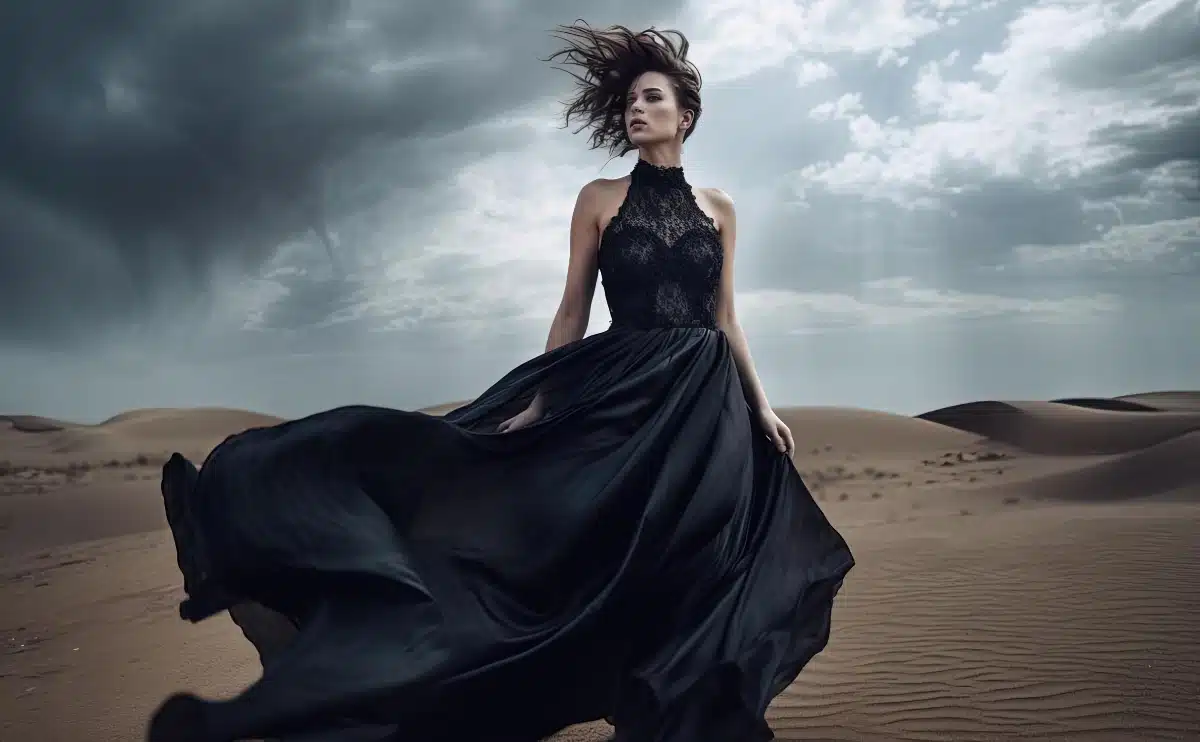
Triumphant Poems About Resurrection
Delve into a collection of the most inspiring poems about resurrection, meticulously organized for your reading exploration.
Whether you’re seeking works that dive into the profound themes of rebirth and renewal, or ponder on the transformative power of resurrection in life’s cycles, our compilation offers a diverse range of uplifting examples.
With our carefully curated selection, the finest poems about resurrection are all conveniently located in one place.
So, take a moment to explore and savor the hope and revitalization these verses have sparked in poets throughout history!
Continue reading and relish the journey!
My #1 Favorite Poem About Resurrection

“The Resurrection” by Rev. Benjamin Copeland
Relentless as the council is the cross;
The Nazarene is bruised and torn;
Mourn! ye despised disciples, mourn!
Priest, scribe, and elder triumph in your loss.
The watch is set, —the sepulcher is sure ;
Death and the grave and Rome unite—
Triumvirate of matchless might—
To make Sin’s vaunted victory secure.
Secure? With sudden awe the aged earth
Feels him alive within the tomb;
And lo! emerging from the gloom,
The brightest morning since creation’s birth!
The nations see the Dayspring from on high,
And greet the mighty miracle
With songs that shake the gates of hell.
And animate the anthems of the sky.
Short Poems About Resurrection
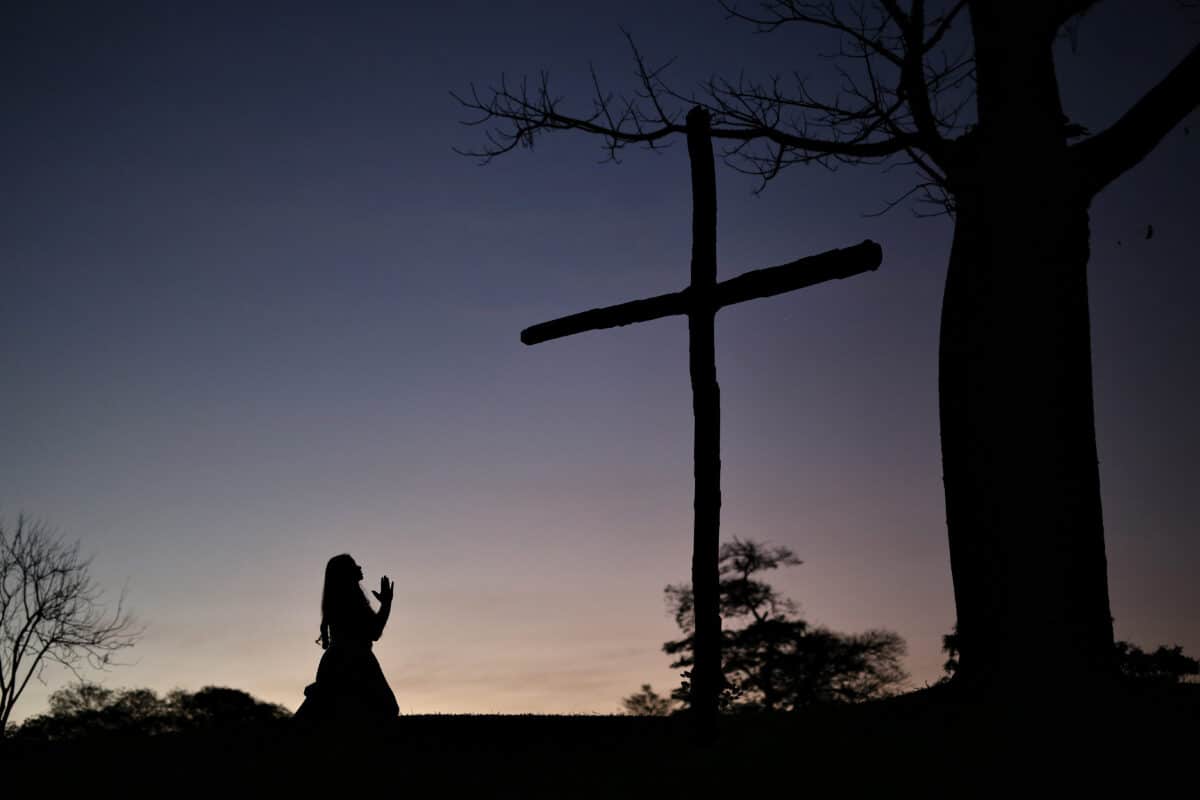
“Resurrection” by Ella Wheeler Wilcox
Pausing a moment ere the day was done,
While yet the earth was scintillant with light,
I backward glanced. From valley, plain, and height,
At intervals, where my life-path had run,
Rose cross on cross; and nailed upon each one
Was my dead self. And yet that gruesome sight
Lent sudden splendour to the falling night,
Showing the conquests that my soul had won.
Up to the rising stars I looked and cried,
‘There is no death! for year on year, re-born
I wake to larger life: to joy more great,
So many times have I been crucified,
So often seen the resurrection morn,
I go triumphant, though new Calvaries wait.
“The Resurrection of Alcilia” by Algernon Charles Swinburne
Sweet song-flower of the May spring of our song,
Be welcome to us, with loving thanks and praise
To his good hand who travelling on strange ways
Found thee forlorn and fragrant, lain along
Beneath dead leaves that many a winter’s wrong
Had rained and heaped through nigh three centuries’ maze
Above thy May bloom, hiding from our gaze
The life that in thy leaves lay sweet and strong.
For thine have life, while many above thine head
Piled by the wind lie blossomless and dead.
So now disburdened of such load above
That lay as death’s own dust upon thee shed
By days too deaf to hear thee like a dove
Murmuring, we hear thee, bird and flower of love.
“The Resurrection Of The Tattooed Girl” by Yazid Ebn Moauia (Edward Powys Mathers, Translator)
Her hands are filled with what I lack,
And on her arms are pictures,
Looking like files of ants forsaking the battalions,
Or hail inlaid by broken clouds on green lawns.
She fears the arrows of her proper eyes
And has her hands in armour.
She has stretched her hands in a cup to me,
Begging for my heart.
She has circled me with the black magic of her brows
And shot small arrows at me.
The black curl that lies upon her temple
Is a scorpion pointing his needle at the stars.
Her eyes seem tight, tight shut;
But I believe she is awake.
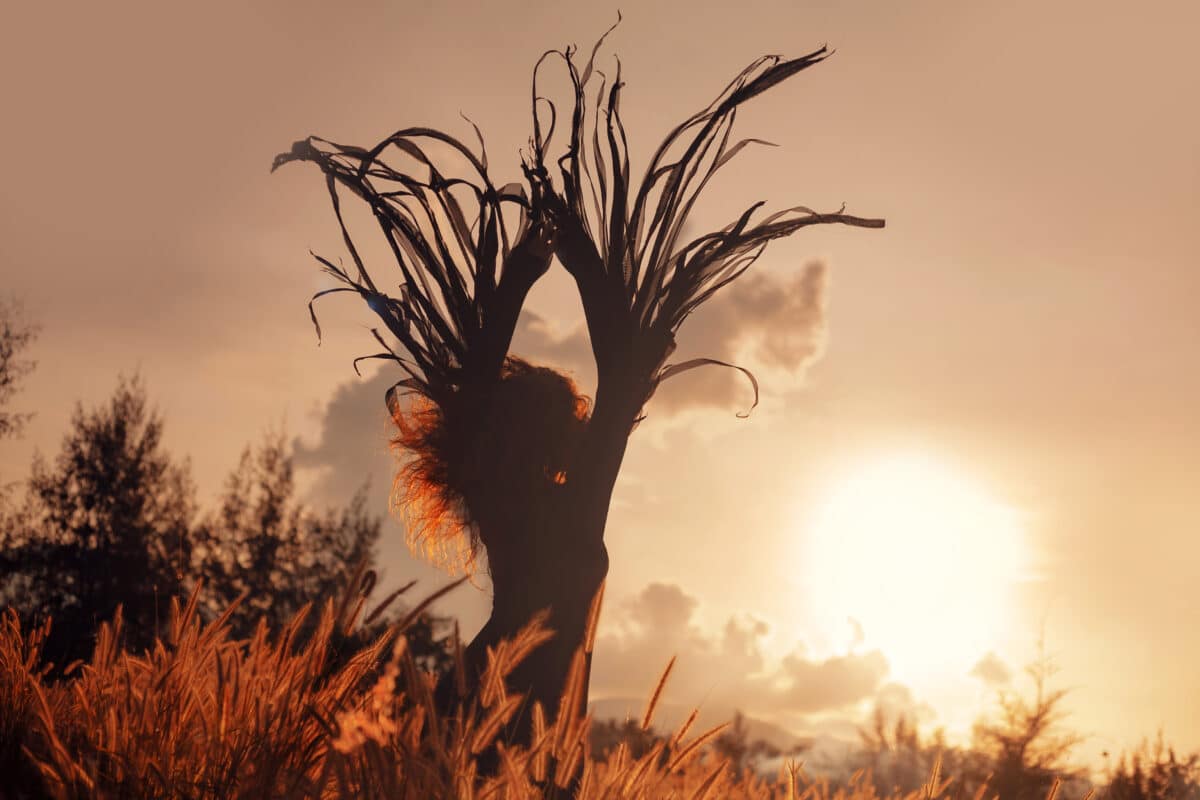
“The Resurrection Possible And Probable” by Robert Herrick
For each one body that i’ th’ earth is sown,
There’s an uprising but of one for one;
But for each grain that in the ground is thrown,
Threescore or fourscore spring up thence for one:
So that the wonder is not half so great
Of ours as is the rising of the wheat.
“The Resurrection” by George Herbert
I got me flowers to strew Thy way;
I got me boughs off many a tree:
But Thou wast up by break of day
And brought’st Thy sweets along with Thee.
The sun arising in the East,
Though he give light, and the East perfume;
If they should offer to contest
With Thy arising, they presume .
Can there be any day but this,
Though many suns to shine endeavor?
We count three hundred, but we miss:
There is but One, and that One ever.
“Easter Virelay” by Arthur Cleveland Coxe
1.
Wake thou that sleepest!
Joy thou that weepest,
Lift up the head
Cease from thy moaning
Sighing and groaning,
Rise from the dead.
2.
Weary wayfarer,
Fainting cross- bearer,
Bending adown ;
Hark! how the Spirit
Bids thee inherit
Life and a crown.
3.
Lo! to restore thee
Christ goes before thee,
Through the deep vale,
Gloomy and darkling;
Paradise sparkling
There shall unveil.
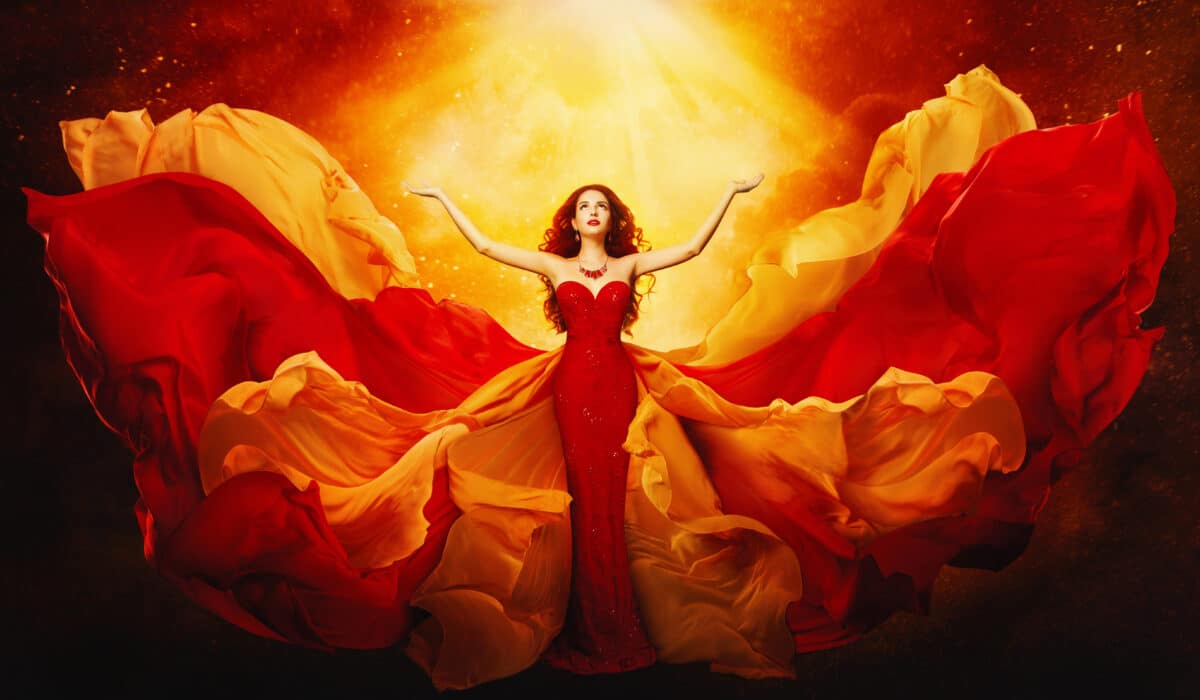
“To The Fallen” by Claude Houghton
Out of the flame-scarred night one came to me
And whispered , “He is dead.”… But I, who find
Thy resurrection in each noble mind,
Thy soul in every deed of chivalry,
I can but think , while lives nobility,
While honour lights a path for humankind,
While aught is beautiful , or aught enshrined,
Death hath o’ertaken but not conquered thee.
Until all loveliness shall pass away,
Until the darkness dies no more in dawn,
Until the lustre of the stars is shed,
Till no dream mocks the madness of the fray,
Till love has learnt to leer and pride to fawn,
Till heaven is sunk in hell thou art not dead.
“Time and Eternity (IV.)” by Emily Dickinson
Safe in their alabaster chambers,
Untouched by morning and untouched by noon,
Sleep the meek members of the resurrection,
Rafter of satin, and roof of stone.
Light laughs the breeze in her castle of sunshine;
Babbles the bee in a stolid ear;
Pipe the sweet birds in ignorant cadence, —
Ah, what sagacity perished here!
Grand go the years in the crescent above them;
Worlds scoop their arcs, and firmaments row,
Diadems drop and Doges surrender,
Soundless as dots on a disk of snow.
“Christ Divine” by Kate Louise Wheeler
Never can I forget Thee, Christ divine,
Never grow weary of this love of Thine,
Never deny Thee, from Thee turn away,
Nor cease to love Thee every passing day.
When storms of life are threatening very near,
Thy voice, dear Saviour, let me ever hear;
And when my sky is very clear and bright
Be Thou my sun, my never-failing light.
While I shall live, be Thou a life for me,
And when I die, my resurrection be.
When I shall enter Heavenly mansions fair,
Be Thou the first to meet and greet me there.
While, thro’ the endless years of which I dream,
I touch the golden harp, be Thou my theme,
On earth, in Heaven, forevermore be mine,—
My first, my last, my only Christ divine.

“Time and Eternity (XXIV.)” by Emily Dickinson
Afraid? Of whom am I afraid?
Not death; for who is he?
The porter of my father’s lodge
As much abasheth me.
Of life? ‘T were odd I fear a thing
That comprehendeth me
In one or more existences
At Deity’s decree.
Of resurrection? Is the east
Afraid to trust the morn
With her fastidious forehead?
As soon impeach my crown!
“An Easter Flower Gift” by John Greenleaf Whittier
O dearest bloom the seasons know,
Flowers of the Resurrection blow,
Our hope and faith restore;
And through the bitterness of death
And loss and sorrow, breathe a breath
Of life forevermore!
The thought of Love Immortal blends
With fond remembrances of friends;
In you, O sacred flowers,
By human love made doubly sweet,
The heavenly and the earthly meet,
The heart of Christ and ours!
“Resurrection” by John Donne
Moist with one drop of Thy blood, my dry soul
Shall—though she now be in extreme degree
Too stony hard, and yet too fleshly—be
Freed by that drop, from being starved, hard or foul,
And life by this death abled shall control
Death, whom Thy death slew; nor shall to me
Fear of first or last death bring misery,
If in Thy life-book my name thou enroll.
Flesh in that long sleep is not putrified,
But made that there, of which, and for which it was;
Nor can by other means be glorified.
May then sin’s sleep and death soon from me pass,
That waked from both, I again risen may
Salute the last and everlasting day.
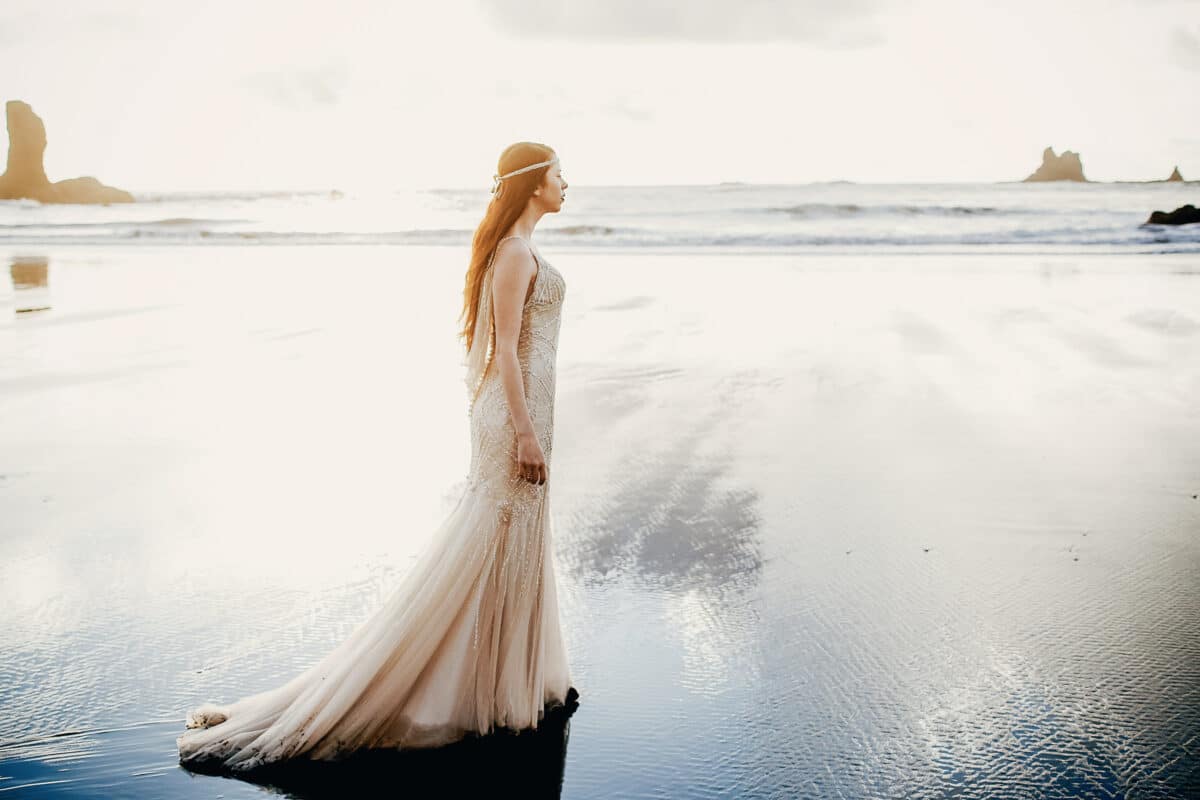
“To the Lady Magdalen Herbert, Of St. Mary Magdalen” by John Donne
Her of your name, whose fair inheritance
Bethina was, and jointure Magdalo,
An active faith so highly did advance,
That she once knew, more than the Church did know,
The Resurrection; so much good there is
Deliver’d of her, that some Fathers be
Loth to believe one woman could do this;
But think these Magdalens were two or three.
Increase their number, Lady, and their fame;
To their devotion add your innocence;
Take so much of th’ example as of the name,
The latter half; and in some recompense,
That they did harbour Christ Himself, a guest,
Harbour these hymns, to His dear Name address’d.
“Resurrection, Imperfect” by John Donne
Sleep, sleep, old sun, thou canst not have repass’d,
As yet, the wound thou took’st on Friday last;
Sleep then, and rest; the world may bear thy stay;
A better sun rose before thee to-day;
Who—not content to enlighten all that dwell
On the earth’s face, as thou—enlighten’d hell,
And made the dark fires languish in that vale,
As at thy presence here our fires grow pale;
Whose body, having walk’d on earth, and now
Hasting to heaven, would—that He might allow
Himself unto all stations, and fill all—
For these three days become a mineral.
He was all gold when He lay down, but rose
All tincture, and doth not alone dispose
Leaden and iron wills to good, but is
Of power to make e’en sinful flesh like his.
Had one of those, whose credulous piety
Thought that a soul one might discern and see
Go from a body, at this sepulchre been,
And, issuing from the sheet, this body seen,
He would have justly thought this body a soul,
If not of any man, yet of the whole.
“The Resurrection” by Tommaso Campanella (J. A. Symonds, Translator)
If Christ was only six hours crucified
After few years of toil and misery,
Which for mankind He suffered willingly,
While heaven was won for ever when He died;
Why should He still be shown on every side,
Painted and preached in nought but agony,
Whose pains were light matched with His victory,
When the world’s power to harm Him was defied?
Why rather speak and write not of the realm
He rules in heaven, and soon will bring below
Unto the praise and glory of His name.
Ah, foolish crowd! This world’s thick vapours whelm
Your eyes, unworthy of that glorious show,
Blind to His splendour, bent upon His shame.
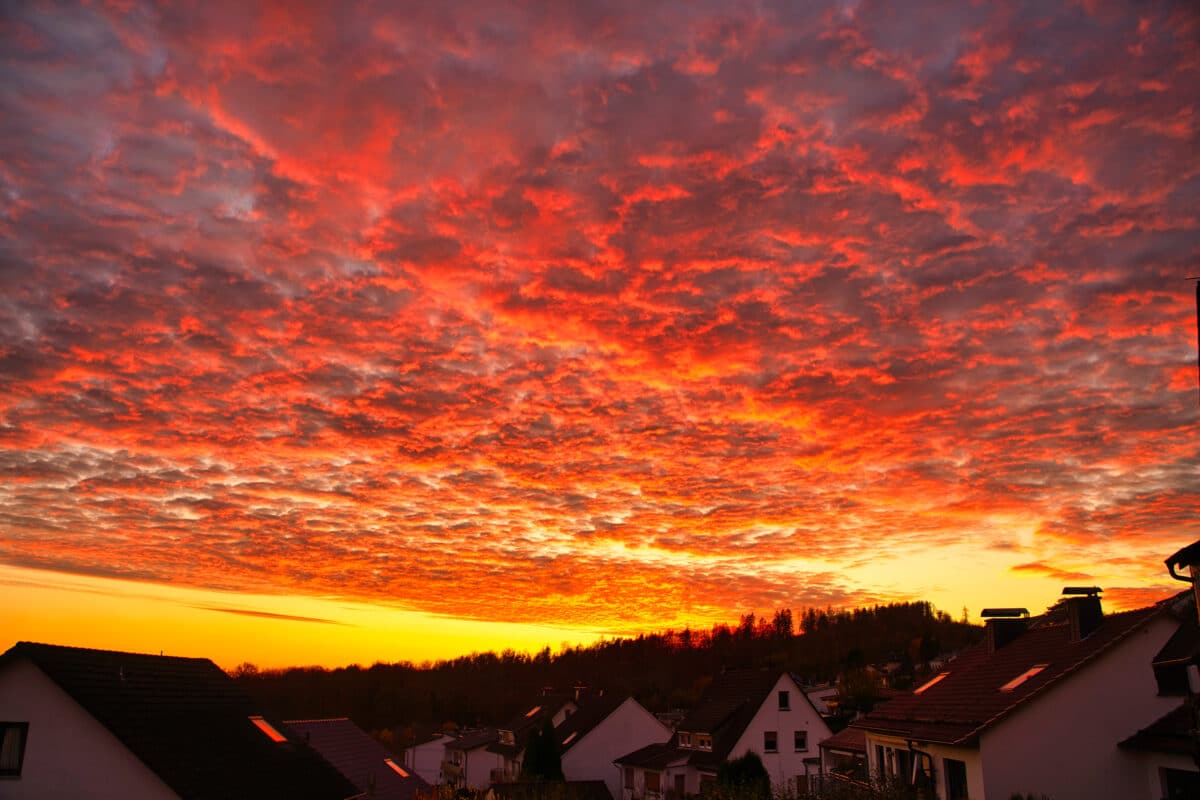
“Easter Day” by Edmund Spenser
Most glorious Lord of life, that on this day
Didst make Thy triumph over death and sin,
And, having harrowed hell, didst bring away
Captivity thence captive, us to win;
This joyous day, dear Lord, with joy begin,
And grant that we, for whom Thou diddest die,
Being with Thy dear blood clean washed from sin,
May live for ever in felicity!
And that Thy love we weighing worthily
May likewise love Thee for the same again;
And for Thy sake, that all like dear didst buy,
With love may one another entertain.
So let us love, dear Love, like as we ought;
Love is the lesson which the Lord us taught.
“Christ To Thomas” by Richard Crashaw, C.
Harsh faith, and wouldst thou probe these signs of woe?
O cruel fingers, would ye prove God so?
Touch them lest thou shouldest doubt? Then have thy will;
But ah, thy doubting makes them deeper still.
“Easter” by George Herbert
Awake, sad heart, whom sorrow ever drowns;
Take up thine eyes, which feed on earth;
Unfold thy forehead gathered into frowns:
Thy Saviour comes, and with Him mirth:
Awake, awake;
And with a thankful heart his comforts take!
got me flowers to straw Thy way;
I got me boughs off many a tree:
But Thou wast up by break of day,
And brought’st Thy sweets along with Thee.
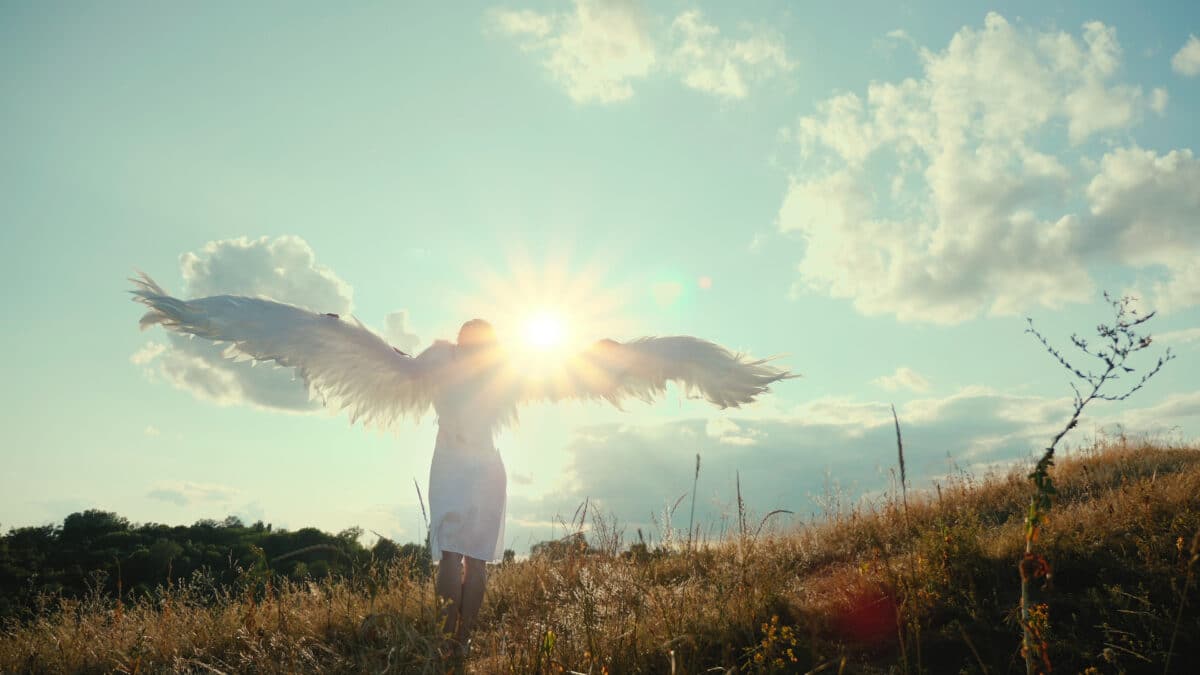
“On The Resurrection” by Rev. James Tweed
If knowing, Lord, Thy pristine dignity,
Thy suffering shocked us, and the Cross was shame;
Yet when Thy power inherent overcame
The grave, and shewed Thou couldst not wholly die;
The scandal ceased which shamed us for a time,
Thy suffering voluntary thus was proved
A sacrifice, to save the lost but loved,
Made by humiliation more sublime.
As ignorance th’ entire eclipse of light.
Has sometimes feared and dreaded darkness’ reign.
Nor knew it temporary, till again
The sun emerging shone as ever bright:
So though we deemed Thee for a while debased.
That thought Thy glorious rising has effaced.
Famous Poems About Resurrection
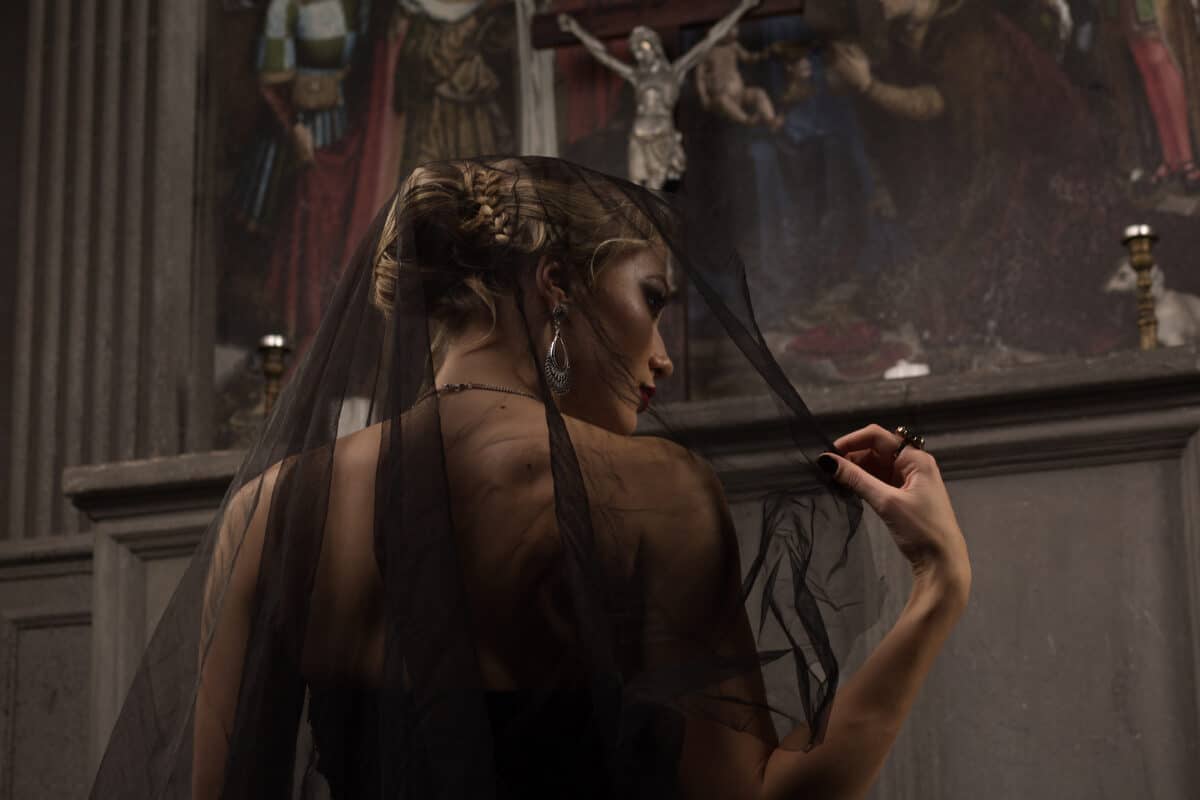
“Resurrection” by Emily Elizabeth Dickinson
‘T was a long parting, but the time
For interview had come;
Before the judgment-seat of God,
The last and second time
These fleshless lovers met,
A heaven in a gaze,
A heaven of heavens, the privilege
Of one another’s eyes.
No lifetime set on them,
Apparelled as the new
Unborn, except they had beheld,
Born everlasting now.
Was bridal e’er like this?
A paradise, the host,
And cherubim and seraphim
The most familiar guest.
“A Better Resurrection” by Christina Georgina Rossetti
I have no wit, no words, no tears;
My heart within me like a stone
Is numb’d too much for hopes or fears;
Look right, look left, I dwell alone;
I lift mine eyes, but dimm’d with grief
No everlasting hills I see;
My life is in the falling leaf:
O Jesus, quicken me.
My life is like a faded leaf,
My harvest dwindled to a husk:
Truly my life is void and brief
And tedious in the barren dusk;
My life is like a frozen thing,
No bud nor greenness can I see:
Yet rise it shall—the sap of Spring;
O Jesus, rise in me.
My life is like a broken bowl,
A broken bowl that cannot hold
One drop of water for my soul
Or cordial in the searching cold;
Cast in the fire the perish’d thing;
Melt and remould it, till it be
A royal cup for Him, my King:
O Jesus, drink of me.
“A Hymn of the Resurrection” by William Drummond
Life out of death, light out of darkness springs,
From a base jail forth comes the King of kings.
What late was mortal, thrall’d to every woe
That lackeys life, or upon sense doth grow,
Immortal is of an eternal stamp,
Far brighter beaming than the morning lamp:
So from a black eclipse outpeers the sun:
Such (when her course of days have on her run
In a far forest in the pearly east,
And she herself hath burnt her spicy nest)
The lonely bird with youthful pens and comb,
Doth soar from out her cradle and her tomb:
So a small seed that in the earth lies hid
And dies, reviving bursts her cloddy side,
Adorn’d with yellow locks of new is born,
And doth become a mother great with corn,
Of grains brings hundreds with it, which when old
Enrich the furrows with a sea of gold.
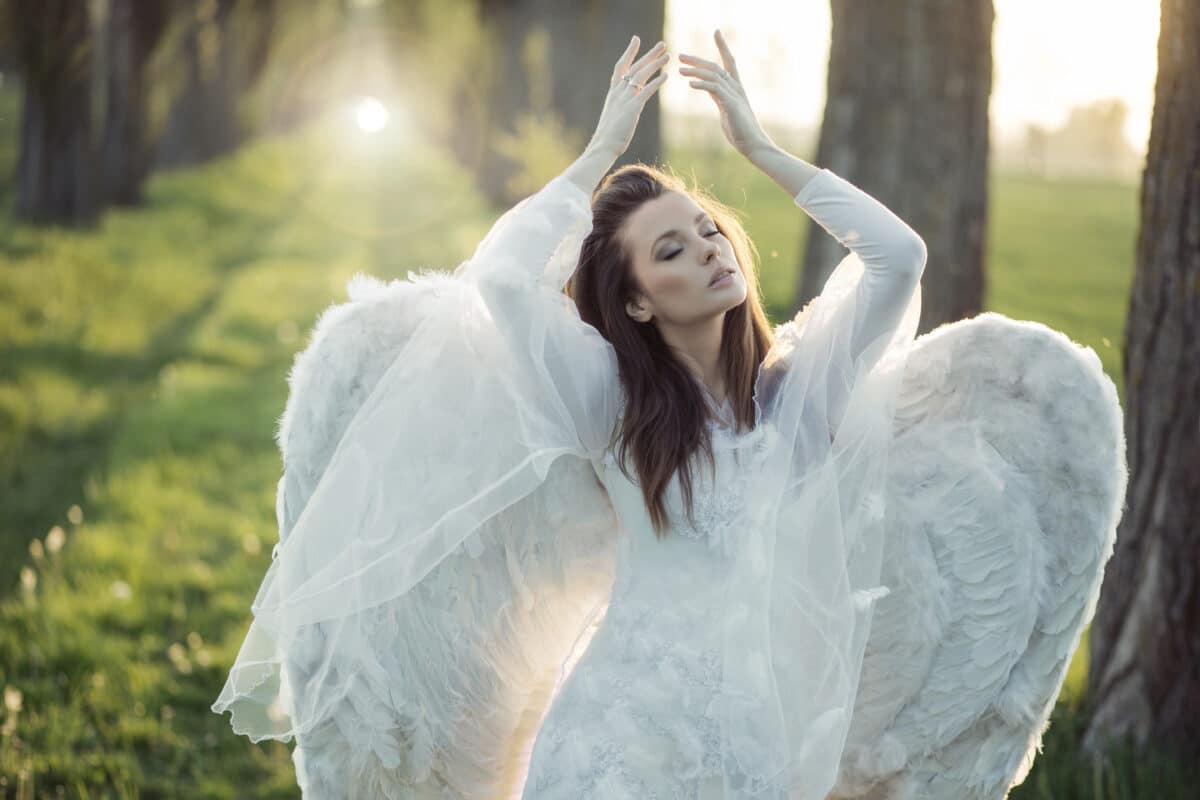
“Easter Morn” by Ella Wheeler Wilcox
A truth that has long lain buried
At Superstition’s door,
I see, in the dawn uprising
In all its strength once more.
Hidden away in the darkness,
By Ignorance crucified,
Crushed under stones of dogmas –
Yet lo! it has not died.
It stands in the light transfigured,
It speaks from the heights above,
“EACH SOUL IS ITS OWN REDEEMER;
THERE IS NO LAW BUT LOVE.”
And the spirits of men are gladdened
As they welcome this Truth re-born
With its feet on the grave of Error
And its eyes to the Easter Morn.
“Resurrection” by Richard Le Gallienne
Is it your face I see, your voice I hear?
Your face, your voice, again after these years!
O is your cheek once more against my cheek?
And is this blessed rain, angel, your tears?
You have come back, – how strange – out of the grave;
Its dreams are in your eyes, and still there clings
Dust of the grave on your vainglorious hair;
And a mysterious rust is on these rings –
The ring we gave each other, that young night
When the moon rose on our betrothal kiss;
When the sun rose upon our wedding day,
How wonderful it was to give you this!
I dreamed you were a bird or a wild flower,
Some changed lovely thing that was not you;
Maybe, I said, she is the morning star,
A radiance unfathomably far –
And now again you are so strangely near!
Your face, your voice, again after these years!
Is it your face I see, your voice I hear,
And is this blessed rain, angel, your tears?
From “By Way of Remembrance” by Christina G. Rossetti
In Resurrection is it awfuller
That rising ofthe All or of the Each
Of all kins of all nations of all speech,
Or one by one of him and him and her?
When dust reanimate begins to stir,
Here, there, beyond, beyond, reach beyond reach ;
While every wave disgorges on its beach,
Alive or dead- in- life, some seafarer.
In Resurrection, on the day of days,
That day of mourning throughout all the earth,
In Resurrection may we meet again :
No more with stricken hearts to part in twain ;
As once in sorrow one, now one in mirth,
One in our resurrection- songs of praise.
I love you and you know it-this at least,
This comfort is mine own in all my pain :
You know it, and can never doubt again,
And love’s mere self is a continual feast :
Not oath of mine nor blessing- word of priest
Could make my love more certain or more plain.
Life as a rolling moon doth wax and wane
Oweary moon, still rounding, still decreased !
Life wanes and when Love folds his wings above
Tired joy, and less we feel his conscious pulse,
Let us go fall asleep, dear Friend , in peace ;
A little while, and age and sorrow cease ;
Alittle while, and love reborn annuls
Loss and decay and death—and all is love.
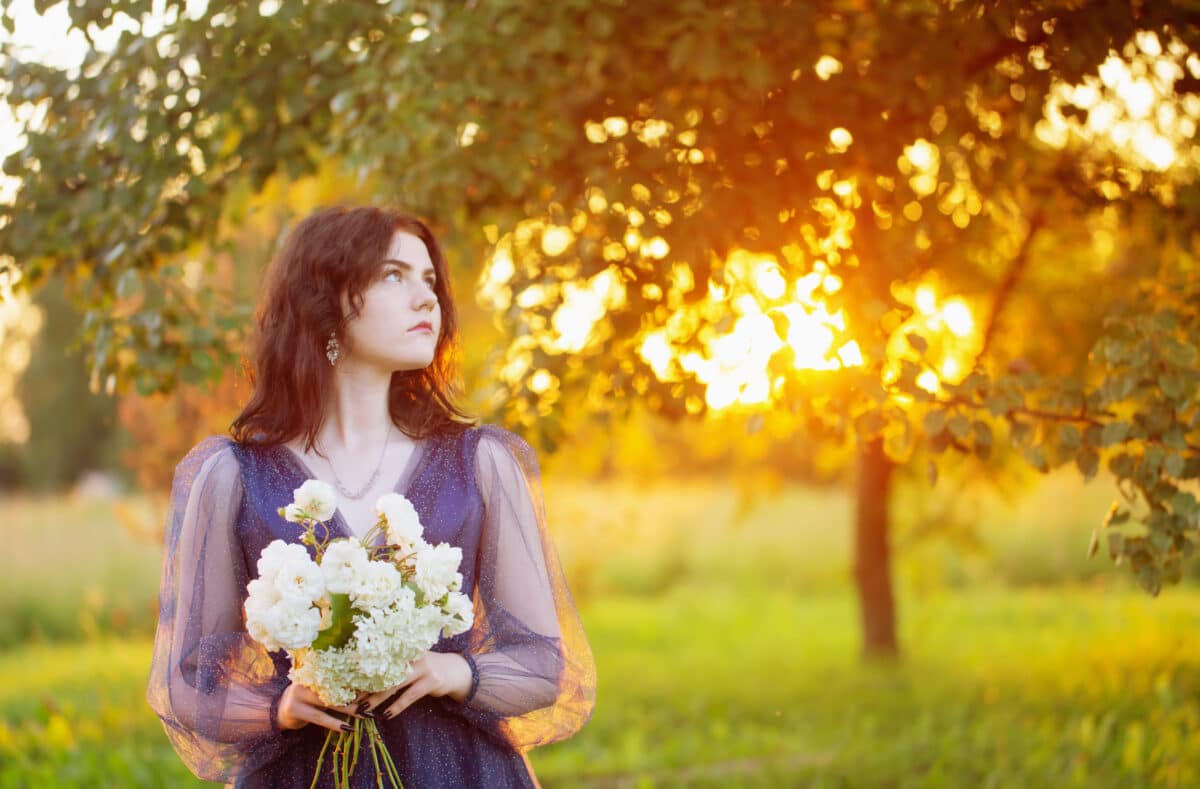
“An Easter Carol” by Christina G. Rossetti
Spring bursts to-day,
For Christ is risen and all the earth’s
at play.
Flash forth, thou Sun,
The rain is over and gone, its work is done.
Winter is past,
Sweet Spring is come at last, is come at last.
Bud, Fig and Vine,
Bud, Olive, fat with fruit and oil and wine.
Break forth this morn
In roses, thou but yesterday a Thorn.
Uplift thy head,
O pure white Lily through the Winter dead.
Beside your dams
Leap and rejoice, you merry-making Lambs.
All Herds and Flocks
Rejoice, all Beasts of thickets and of rocks.
Sing, Creatures, sing,
Angels and Men and Birds and everything.
All notes of Doves
Fill all our world: this is the time of loves.
Poems About the Death and Resurrection of Jesus
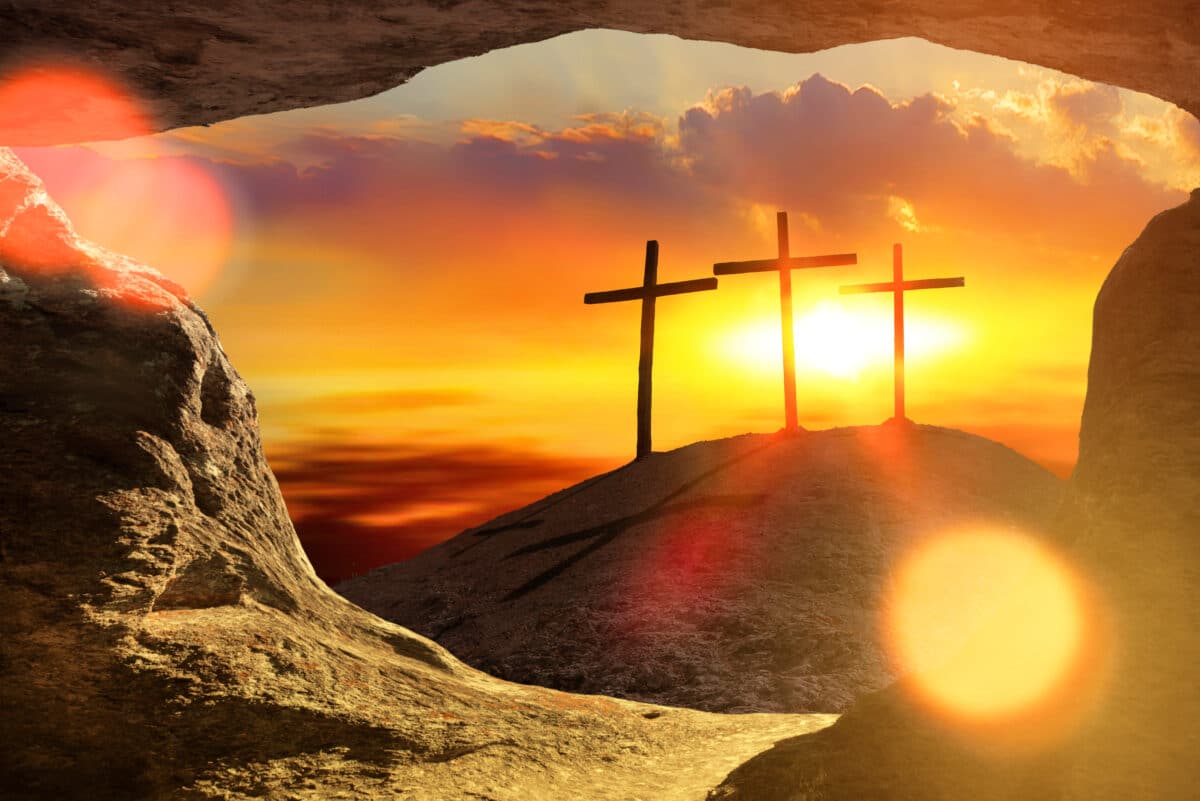
“The Resurrection” by Robert Herrick
That Christ did die, the pagan saith;
But that He rose, that’s Christians’ faith.
“Easter Bells” by Kate Seymour Maclean
h bells of Easter morn, oh solemn sounding bells,
Which fill the hollow cells
Of the blue April air with a most sweet refrain,
Ye fill my heart with pain.
For when, as from a thousand holy altar-fires,
A thousand resonant spires
Sent up the offering-the glad thanksgiving strain-
‘The Lord is risen again!’
He went from us who shall return no more, no more!
I say the sad words o’er,
And they are mixed and blent with your triumphant psalm,
Like bitterness and balm,
We stood with him beside the black and silent river,
Cold, cold and soundless ever;
But there our feet were stayed-unloosed our clasping fond,
And he has passed beyond.
And still that solemn hymn, like smoke of sacrifice,
Clomb the blue April skies,
And on our anguish placed its sacramental chrism,
‘Behold, the Lord is risen!’
Oh, bells of Easter morn! your mighty voices reach
A deeper depth than speech;
We heard, ‘Because He liveth they shall live with Him;’
This was our Easter hymn.
And while the slow vibrations swell, and sink, and cease,
They bring divinest peace,
For we commit our best beloved to the dust,
In sure and certain trust.
“The Resurrection” by A. L. O. E.
The Summer blossoms fast decay
Beneath the Autumn’s chilling breath,
And man is passing thus away,
Touched by the silent hand of Death.
Still fading—falling—day by day
The withered petals strew the plain,
They never more shall deck the spray—
But man shall rise again!
Behold the bare and leafless tree
Blushes in spring to beauty bright;
Where the dark root was buried—see
The eager floweret springs to light!
The sun his gentle influence shed
To break cold winter’s icy chain—
So God shall wake us from the dead,
We all shall rise again!
As beauteous day succeeds to night,
So glory dawns upon the grave—
Praise to the Sun of life and light,
Who lived to bless, and died to save!
We calmly gaze on life’s dark close,
The tomb shall not our forms retain—
E’en as our God and Saviour rose
His own shall rise again!
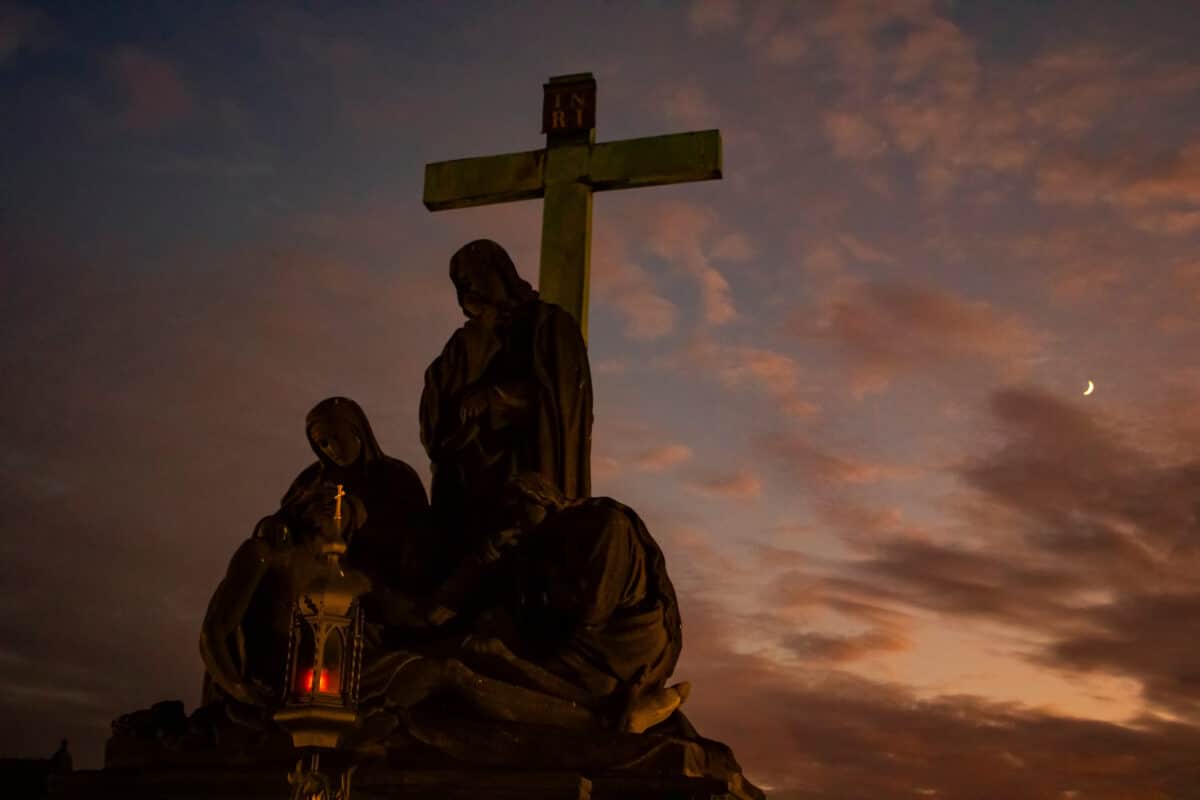
“The Death of Christ” by Peter Neilson
With a strong voice our Saviour cried aloud,
And yielded up his sweet and precious life:
And lo! within the Temple was the veil
Asunder rent, the Earth affrighted shook
With awful tremblings, and the rocks were rent;
The yawning graves gave up their buried dead,
And of the Saints who slept arose, many
And to the holy city straightway went;
And many saw these Saints who left their graves
After the resurrection of our Lord.
When the Centurion and his armed band
Who watched the crucifixion of our Lord,
Had seen the dreadful earthquake, and the signs
And wonders which appeared, they feared the Lord,
And said, “most surely this was God’s own Son.”
“Song For Easter” by Arthur Cleveland Coxe
1.
Christ hath arisen!
Broken His prison,
Man to deliver
From death’s gloomy reign.
Victor Immortal!
Hell’s gloomy portal
Of brass and of iron
He rendeth in twain.
2.
Wake every nation!
Songs of salvation
Round the great earth
Let them echo to-day.
Life to the dying!
Sorrow and sighing
The sunrise of glory
Hath driven away.
3.
Darkness hath vanished!
Death’s sting is banished:
See the bright mansions
Of Paradise ope!
Grave thou art broken;
Jesus hath spoken
Joy to the Universe,
Glory and Hope.
4.
Tell how He liveth:
Sing what He giveth;
Sound the great name
Of the risen I-AM
Feed on His manna:
Raise the Hosanna!
Full be the choral-song
Worthy the Lamb.
“Easter Day” by William Lisle Bowles
Who comes (my soul no longer doubt),
Rising from earth’s wormy sod,
And whilst ten thousand angels sing,
Ascends – ascends to heaven, a God?
Saviour, Lord, I know thee now!
Mighty to redeem and save,
Such glory blazes on thy brow,
Which lights the darkness of the grave.
Saviour, Lord, the human soul,
Forgotten every sorrow here,
Shall thus, aspiring to its goal,
Triumph in its native sphere.
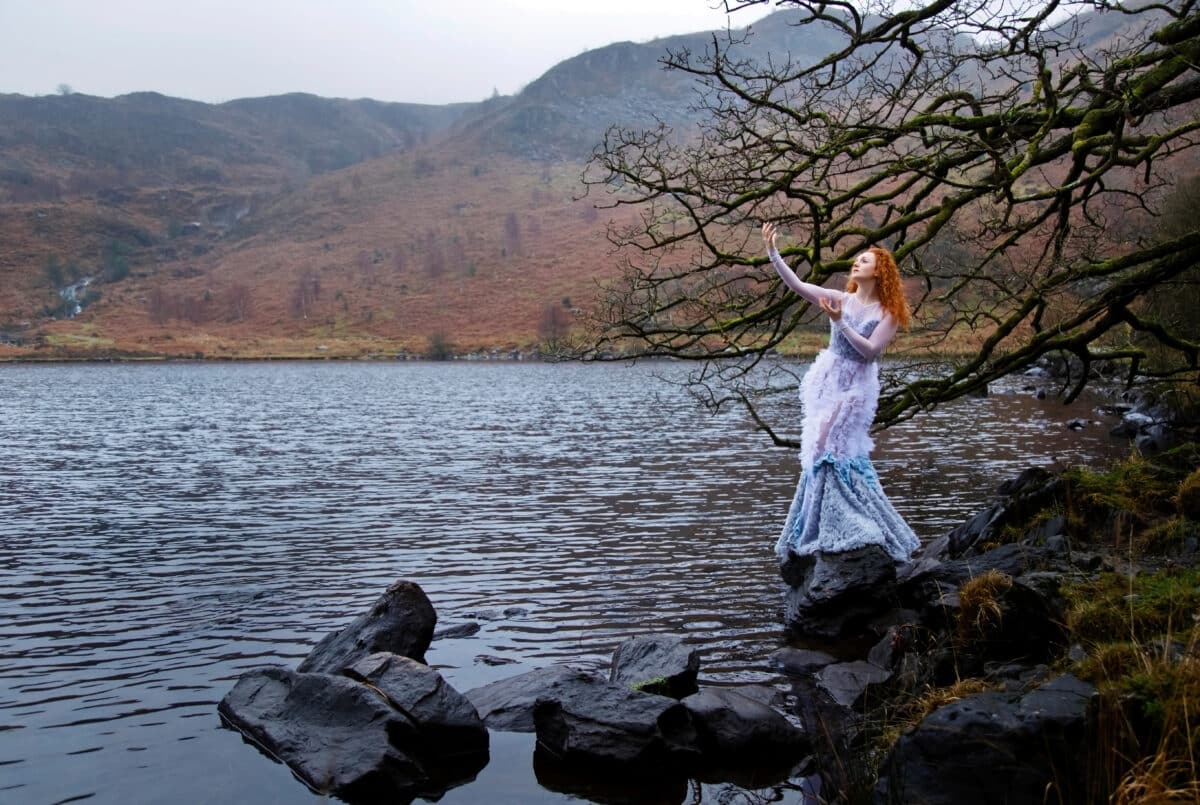
“Splendor of the Lilies” by Margaret Elizabeth Munson Sangster
Oh, rare as the splendor of lilies,
And sweet as the violet’s breath,
Comes the jubilant morning of Easter,
The triumph of life over death;
And fresh from the earth’s quickened bosom
Full baskets of flowers we bring,
And scatter their satin soft petals
To carpet a path for our King.
In the countless green blades of the meadow,
The sheen of the daffodil’s gold,
In the tremulous blue on the mountains,
The opaline mist on the wold,
In the tinkle of brooks through the pasture,
The river’s strong sweep to the sea,
Are signs of the day that is hasting
In gladness to you and to me.
Oh, dawn in thy splendor of lilies,
Thy fluttering violet breath,
Oh, jubilant morning of Easter,
Thou triumph of life over death!
Then fresh from the earth’s quickened bosom
Full baskets of flowers we bring,
And scatter their satin soft petals
To carpet a path for our King.
“The First Resurrection” by James Montgomerie
O Son of Man! Thou art the Resurrection,
The Life and Resurrection of the just;
Thou bringest human nature to perfection,
Gold to the cedar, -Deity to dust;
Death hast Thou trod to death beneath Thy feet,
And, from the eater, to Thy race brought meat.
The lion from the pit came forth and saw
Judah’s strong lion, and he fled, and hid:
Yet the Almighty with His fiery law
Appear’d and rent Thee like a little kid;
Måking the grave a bed of love, that we,
Like babes on mothers’ breast, might sleep in Thee.
Around Thee hung our earthly father’s sin,
And his fair bride’s, who from the testing tree
Tore heav’n’s pure seal, and let the Jordan in
To cover earth, like a tempestuous sea ;
Emmanuel, God in man, the cup has quaff’d,
And swallow’d up this Jordan at a draught.
And death is a sweet bath of balm and myrrh—
A marriage present for Emmanuel’s bride,
One which He purchas’d, by His blood, for her,
To bring the broken rib back to His side ;
That heav’n, and earth, and hell, might see in one,
God, and the Church, and Christ th’ Eternal Son!
O blessed day! when the dark glass is broke,
Thro’ which the soul gaz’d on eternal day,
When, firmly fix’d upon the living rock,
That soul looks back upon its house of clay;
As the bright insect-its first sunny morn,
Looks on the loathsome place where it was born.
But, like the little maid, the church must sleep,
In love’s pure bed, (where the great Bridegroom lay
And perfum’d it-while angels pure did keep
Continual vigil o’er the precious clay—
With life’s pure blood) where it shall quietly dwell,
To drink the dew of life from death’s dark hell.
Sweet be thy sleep, fair queen !-God’s living breath
Shall fan thee, and the everlasting wing
Protect thee, till the sleep that seemeth death
Pass like a dream : and thou shalt rise and sing;
“The bed of Solomon is pav’d with love,
And I am now His ‘ undefiled , ‘ His ‘ dove. ‘ “
Glory to God ! “—from men and angels burst,
The King of Glory is on earth again,
And all the Royal Seed are risen first,
And taken to His Father’s house to reign ;
Not ‘ mid the tombs in Adam’s lost domain,
Where the fierce lion, vanquish’d, bites his chain.
The sun is darken’d, and the moon is dim,
No star to earth shoots down a feeble ray,
No child of God stands forth to plead for Him
Proud Satan reigns with undisputed sway,
Raising a temple to his own great name,
Which Christ shall make a prison to his shame.
But see, the only Son of the great Sire,
The only daughter of her mother born,
Appear triumphant ‘mid ” the stones of fire,”
Who find themselves eclipsed -their glory shorn;
Yet louder than Mount Sinai’s thunder rings,
Their “Glory, glory, to the King of Kings! “
From “Easter Day II” by Arthur Hugh Clough
Weep not beside His tomb,
Ye women unto whom
He was great comfort and yet greater grief;
Nor ye, ye faithful few that wont with Him to roam,
Seek sadly what for Him ye left, go hopeless to your home;
Nor ye despair, ye sharers yet to be of their belief;
Though He be dead, He is not dead,
Nor gone, though fled,
Not lost, though vanished;
Though He return not, though
He lies and moulders low;
In the true creed
He is yet risen indeed;
Christ is yet risen.
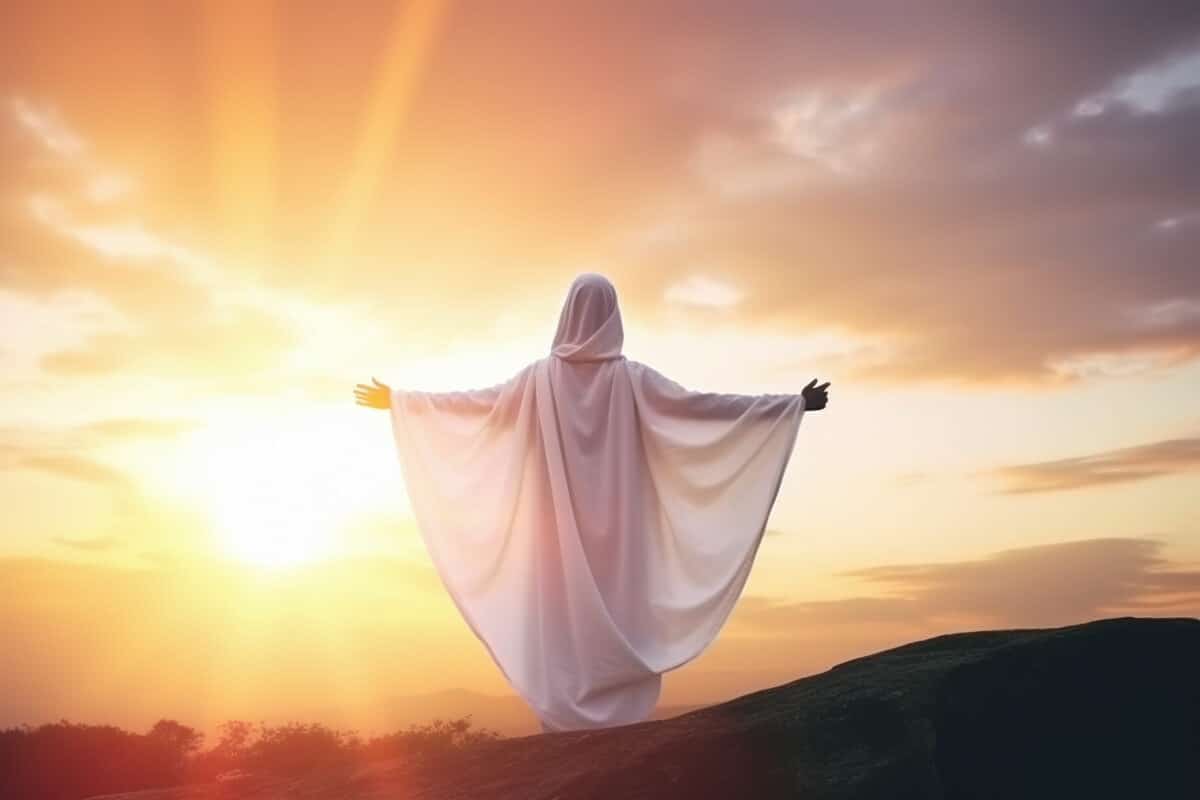
“The Day of Christ” by Rev. Benjamin Copeland
The Son of man will come, —
His promise cannot fail;
The royal Conqueror
Shall over all prevail;
And Earth shall hear his summons dread,
And Death and Hell give up their dead.
Ten thousand thousand saints
His coming shall attend,
And underneath his feet
The firmament shall rend;
And, prostrate at his judgment throne,
The world his sovereignty shall own.
O Son of Mary! hear
A helpless sinner’s prayer,
And, on that awful day,
Make me thy gracious care ;
O, be my heart’s sure hope and stay
When the wide heavens shall flee away.
Keep faithful watch, my soul,
And pray ” Thy kingdom come;”
But leave it all to Him,
How he shall bring thee home;
The resurrection of the just
Shall recompense thy patient trust.
“Easter Even” by Christina Georgina Rossetti
There is nothing more that they can do
For all their rage and boast :
Caiaphas with his blaspheming crew,
Herod with his host;
Pontius Pilate in his judgment hall
Judging their Judge and his,
Or he who led them all and past them all,
Arch-Judas with his kiss.
The sepulchre made sure with ponderous stone,
Seal that same stone, O priest:
It may be thou shalt block the Holy One
From rising in the east.
Set a watch about the sepulchre
To watch on pain of death:
They must hold fast the stone if One should stir
And shake it from beneath.
God Almighty, He can break a seal,
And roll away a stone:
Can grind the proud in dust who would not kneel,
And crush the mighty one.
There is nothing more that they can do
For all their passionate care,
Those who sit in dust, the blessed few,
And weep and rend their hair.
Peter, Thomas, Mary Magdalen,
The Virgin unreproved,
Joseph and Nicodemus foremost men,
And John the well- beloved.
Bring your finest linen and your spice,
Swathe the sacred Dead,
Bind with careful hands and piteous eyes
The napkin round His head:
Lay Him in the garden-rock to rest:
Rest you the Sabbath length:
The Sun that went down crimson in the west
Shall rise renewed in strength.
God Almighty shall give joy for pain,
Shall comfort him who grieves:
Lo He with joy shall doubtless come again
And with him bring His sheaves.
“Easter Night” by Alice Christiana Gertrude Thompson Meynell
All night had shout of men and cry
Of woeful women filled His way;
Until that noon of sombre sky
On Friday, clamour and display
Smote Him; no solitude had He,
No silence, since Gethsemane.
Public was Death; but Power, but Might,
But Life again, but Victory,
Were hushed within the dead of night,
The shutter’d dark, the secrecy.
And all alone, alone, alone
He rose again behind the stone.
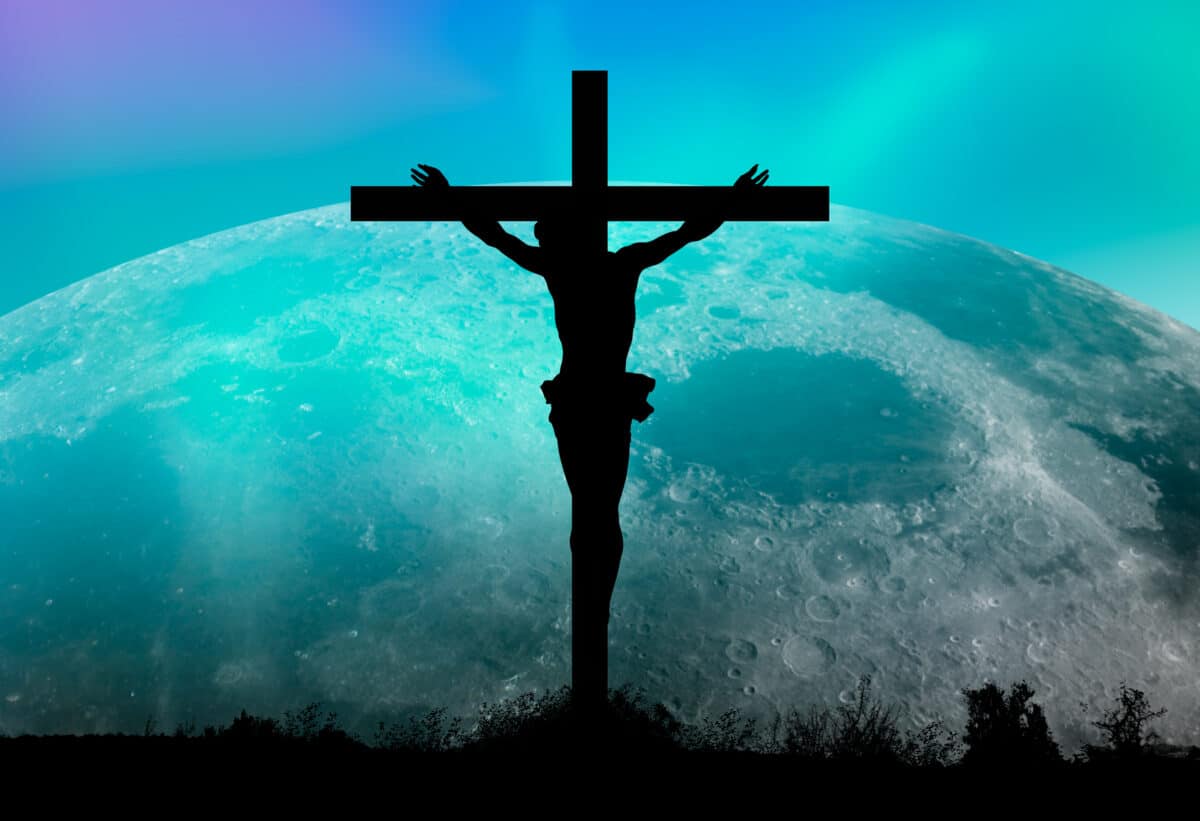
From “The Earthquake” by Arthur Cleveland Coxe
1.
The sun leaps up the golden skies,
And seems to say,
Ev’n so the Son of God did rise
On Easter-Day:
Then early from my bed let me
Rise on the Resurrection Morn;
The dancing sunbeams let me see
Soon as the joyous feast is born.
Yes, early to the church away:
‘Tis Easter-Day, ‘ tis Easter-Day!
2.
The moon went down, and in the dark
The garden lay,
Nor yet had lifted wing the lark
That Easter-Day,
When holy women, as they went
To seek the glorious slumberer,
Felt, as if earth itself were rent,
The shock that shook the sepulchre:
For leap’d the mountains far away,
That Easter-Day-that Easter- Day.
3.
Tabor and Hermon skipped like rams
In gladsome May;
And leap’d the little hills like lambs,
That Easter-Day.
From Libanus, like thunder heard—
That rumbles in the distant sky,
Came sounds as if the mountains stirr’d
To lift their hoary heads on high.
Trembled the earth at morning’s ray,
That Easter- Day—that Easter- Day.
“Easter Sunday, 1916” by William Arthur Dunkerley (John Oxenham)
The sun shone white and fair,
This Eastertide,
Yet all its sweetness seemed but to deride
Our souls’ despair;
For stricken hearts, and loss and pain,
Were everywhere.
We sang our Alleluias,–
We said, “The Christ is risen!
From this His earthly prison,
The Christ indeed is risen.
He is gone up on high,
To the perfect peace of heaven.”
Then, with a sigh,
We wondered…
Our minds evolved grim hordes of huns,
Our bruised hearts sank beneath the guns,
On our very souls they thundered.
Can you wonder?–Can you wonder,
That we wondered,
As we heard the huns’ guns thunder?
That we looked in one another’s eyes
And wondered,–
“Is Christ indeed then risen from the dead?
Hath He not rather fled
For ever from a world where He
Meets such contumely?”
Our hearts were sick with pain,
As they beat the sad refrain,–
“How shall the Lord Christ come again?
How can the Lord Christ come again?
Nay,–will He come again?
Is He not surely fled
For ever from a world where He
Is still so buffeted?”
But the day’s glory all forbade
Such depth of woe. Came to our aid
The sun, the birds, the springing things,
The winging things, the singing things;
And taught us this,–
After each Winter cometh Spring,–
God’s hand is still in everything,–
His mighty purposes are sure,–
His endless love doth still endure,
And will not cease, nor know remiss,
Despite man’s forfeiture.
The Lord is risen indeed!
In very truth and deed
The Lord is risen, is risen, is risen;
He will supply our need.
So we took heart again,
And built us refuges from pain
Within His coverture,–
Strong towers of Love, and Hope, and Faith,
That shall maintain
Our souls’ estate
Too high and great
For even Death to violate.
“The Resurrection of Christ” by Peter Neilson
Nowthe last hours of Sabbath waned apace,
And the soft tints of dawn began to spread
Their purple glories in the eastern sky;
Mary, impatient, with her Sister came
To view the sepulchre where Jesus lay:
And lo ! the trembling earth with horror shook,
And groaned through all her caverns in affright,
For God’s Archangel fromthe highest heavens.
Came with a mighty arm to burst the gates,
And free the prisoner from his dreary tomb.
The ponderous rock he quickly rolled away,
And thereon sat in dignity most bright;
His countenance with awful lightning gleamed,
And his pure raiment shone like whitest snow.
The watchers ofthe tomb with trembling shook,
And prostrate on the earth in terror lay.
In accents gracious, and with aspect mild,
The heavenly messenger then spake, and said
Even to the women, hail! ye faithful pair,
Fear not, nor faint, I know whom now ye seek,
Jesus the well-beloved! the Lamb of God!
Even he, the Saviour who was crucified!
But lo! he is not here, for as he said
Triumphant he hath risen from the grave,
Come! see the spot where your Redeemer lay!
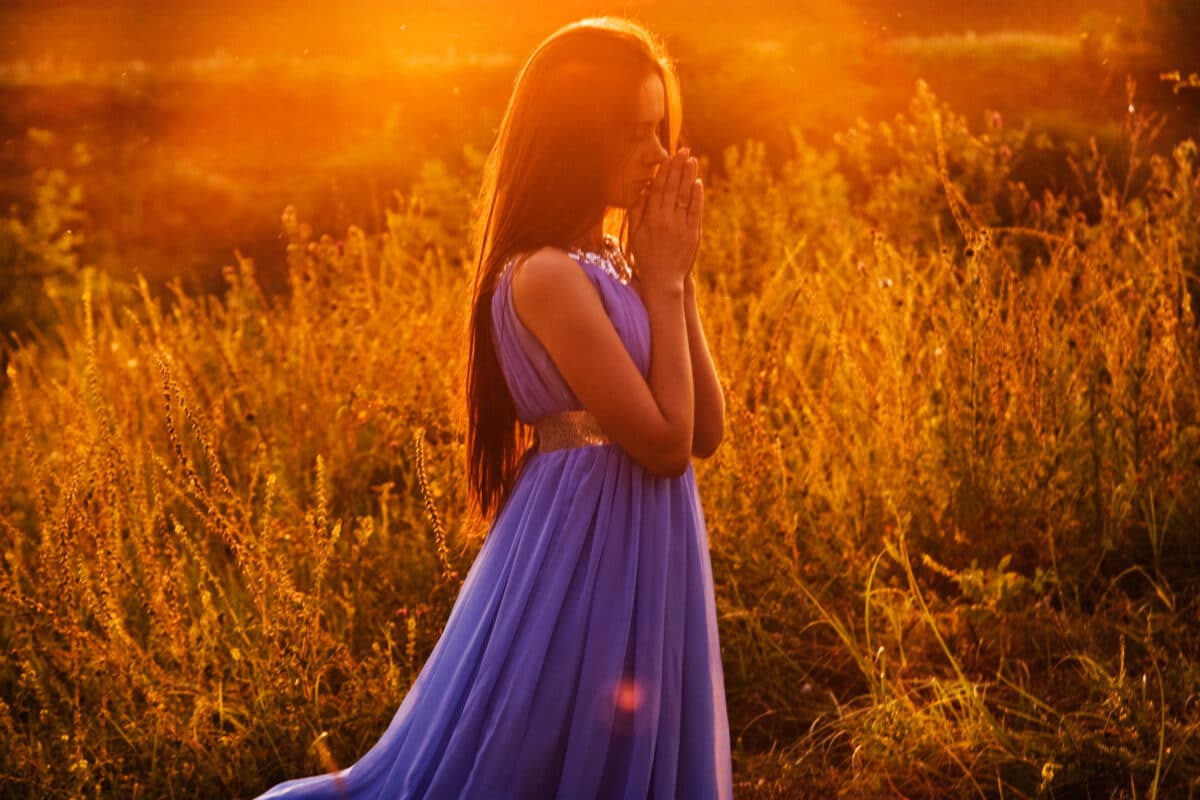
“Easter Week” by Charles Kingsley
See the land, her Easter keeping,
Rises as her Maker rose.
Seeds, so long in darkness sleeping,
Burst at last from winter snows.
Earth with heaven above rejoices;
Fields and gardens hail the spring;
Shaughs and woodlands ring with voices,
While the wild birds build and sing.
You, to whom your Maker granted
Powers to those sweet birds unknown,
Use the craft by God implanted;
Use the reason not your own.
Here, while heaven and earth rejoices,
Each his Easter tribute bring –
Work of fingers, chant of voices,
Like the birds who build and sing.
“Resurrection And Last Judgment” by Peter Neilson
High in the blue ethereal vault of Heaven,
Amid effulgent glory there appeared,
Athrone of snowy brightness, and there sat
The unapproachable, mysterious God ;
Before whose dreadful presence fled the earth,
And the broad Heavens wrapt up like a scroll,
Vanished before his awful countenance,
Lost in the viewless fields of unknown space :
And there I saw the dead both small and great,
Standing in dread array before their God.
And lo ! the Books were opened, even the Books
By which men’s lives and actions must be judged,
Andjudged they were, according to the works
Which in this nether world they had fulfilled.
And the wide Ocean from her deep abyss
And darkest caverns, yielded up her dead;
Yea even Death and Hell gave up their prey,
To stand before the awfuljudgment seat.
Then, Death and Hell, and all their evil works,
And whatsoever name could not be found
Within the pages of the Book of life,
Headlong were hurled adown the burning lake,
There to abide in everlasting flames.
“Easter-Tide” by Rev. Benjamin Copeland
Easter bells are ringing,
Easter anthems rise,
Age and Childhood singing
Strains that seek the skies :
Seek their source, ascending
Where, in rapture sweet,
Song and service blending,
Saint and seraph meet.
“Christ, the Lord, is risen!”
Wondering angels cry;
‘Broken, Death’s dread prison!
Sons of men reply.
Blessed song and story!
Doubt and fear depart, —
Resurrection glory
Floods the faithful heart.
Purest, purest pleasure
In each bosom wells;
Happy, happy measure —
How the choral swells!
Wrath and wrong shall cease;
From this hour undaunted
Reigns the Prince of Peace.
Easter lilies, blowing,
Breathe his praise abroad,—
All their grace bestowing
On the Son of God.
Lo! his brow adorning,
Kings their homage pay;
Hark ! the stars of morning
Hail his boundless sway.

From “The Garden” by Arthur Cleveland Coxe
1.
The flowers are zealous Christians in our clime,
And oft with their sweet selves they seem to vie,
Upspringing, as with holy rivalry,
Which shall look cheerfulest at Easter-time.
2.
Therefore, to me, all gardens in the spring,
Seem Joseph’s garden, with religion rife ;
Full of the Resurrection and the Life ;
Ofteachings full and holy worshipping.
3.
Blest be the darling crocus in its birth,
That from its icy sepulchre doth burst
Full of divine ambition to be first
Of all God’s flowers, in holy Easter- mirth.
4.
And blest the hyacinth, of varied dyes,
That forth , all fragrance from a rotten root,
Like grace from nature’s misery, doth shoot,
In the bright season when the Lord did rise.
5.
Yea, blessed be all flowers that come in time
To deck the Paschal altar ; violet,
Snowdrop, and arbutus, and mosses wet
From rills that cheer the forest with their chime.
“The Butterfly” by Arthur Cleveland Coxe
1.
Where the grave-digger plies his fearful trade,
With mattock and with spade,
Upturning bones and skulls of hollow eye,
Oft lights upon a head, the butterfly,
Cresting its forehead with a gaudy wing,
And fluttering, like a soul, about that horrid
thing.
2.
An idle thought ; but, in that garden’s bound,
That place of skulls around,
Hovered, perchance, that day the Saviour rose,
The Tyrian moth, as beautiful as those
Whose purpled pinions glitter in the sun
Of Ormuz or of Ind , arrayed like Solomon.
3.
Nor deem it vain, a worm may seem sublime
In Easter’s golden prime,
Thus deck’d, and flitting like embodied breath
That pants in resurrection out of death,
For thus to me a parable is shown ;
What Christ of lilies spake expounds not flowers
alone.
4.
For if a worm in winding-sheet down lies,
Instinct with power to rise ;
If the poor thing that crawled may soar —a
nymph,
That fed on dust-may suck the honey’d lymph,
That rotted in dishonour-may be seen
Transfigur’d ev’n like him that dazzled Sheba’s
Queen.
5.
Oh! faithless we, shall God so clothe a worm,
So raise from earth that form,
And leave His children dear, in icy shade,
All unremember’d and forgotton laid ?
Shall we, when Christ returns, less glorious
spring
Out of the dust of death than that transfigur’d
thing?
“Easter” by Arthur Cleveland Coxe
1.
Wake the world! The morning breaks,
Lo! the Lord of life awakes,
See his glory in the skies!
Christ is risen: let us rise.
Of His Promise naught hath failed:
Judah’s Lion hath prevailed .
2.
Sing the patient Lamb’s repose,
Sing the Lion that uprose:
Lamb of God, our sins to bear,
Lion, death and hell to tear;
Lamb-like in the grave to lie;
Judah’s Lion ne’er to die.
3.
Wake, the wondrous tale to tell
How He broke the bars of hell.
He that lay among the dead,
Death itself hath captive led:
Death and hell, the sting and flame,
Judah’s Lion overcame.
4.
Wake the never-ending psalm;
Song of Moses and the Lamb;
Ofthe Lamb, a Victim rent,
Of the Lion’s hardiment,
Spread His praise from shore to shore:
Judah’s Lion dies no more.
5.
Sing His waking from the dead;
Shook the hills, the ocean fled:
Springs of life the grave revealed,
Garden closed and fountain sealed;
And, like lightning from the gloom,
Judah’s Lion rent the tomb.
6.
Christ is risen! weep no more:
Sing the glorious Conqueror;
Songs of His salvation sing:
Where, O Death, thy cruel sting!
Worthy is the Lamb once slain;
Judah’s Lion, live and reign!
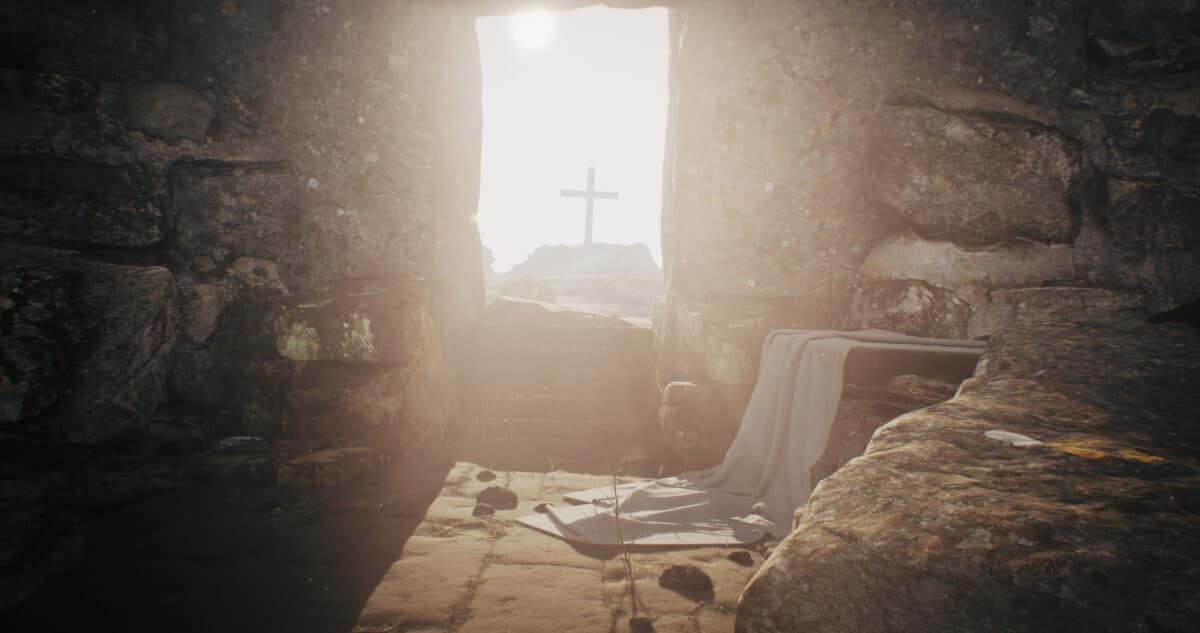
“Who Rose Again From The Dead?” by Margaret Elizabeth Munson Sangster
O Earth, forget thy winter; O Nature, bud
and bloom,
And clothe the slopes with greenness that
late were hung with gloom.
O clustered Easter lilies, your gleaming censers lift,
Forth comes the mighty Victor, the rocky
tomb to rift.
O gentle Easter angels, be swift to greet the
day
When from the guarded chamber the stone
is rolled away,
And Christ the King steps onward, with
Death beneath him dead,
And leads His ransomed homeward, with
glory on His head.
Three days ago they laid Him, all pulseless
on the bier ;
The thorn-marked brow was pallid ; their
hearts stood still in fear.
Three days of solemn stillness, three days of
grief sublime,
A pause when seraphs waited to hear the
throbs of Time.
And now? No burst of music, as when a
babe He came,
Though heaven is thrilled with rapture, and
cherub-anthems flame,
In soundless flight on sweeping, the shining
ones descend
To give our earth the key-note or songs
that shall not end.
What though there are who listen in vain
for voices hushed ?
What though there are who languish o’er
sweet hopes early crushed ?
Still peal the Easter chorals adown the lonely
years,
And yet the Easter promise hath solace for
our tears.
The Christ for us hath conquered our one
relentless foe,
Our vanished ones forever with Him are
safe, we know.
O fragrant Easter lilies, like tapers fair ye
stand,
To light the silent portals that guard the
deathless land.
Haste, gentle Easter angels, who rolled the
stone away,
Come melt our loveless spirits, shame unbelief
this day,
And help us tread it under our footsteps as
we sing
The joyous hymns of Easter around our
risen King.
From “Easter Chords” by Margaret Elizabeth Munson Sangster
Christ the Lord is risen to-day!
Sons of men and angels say,
Raise your joys and triumphs high,
Sing ye heavens, and earth reply.
Sweet, sweet and clear the dear old strain
across the aisles is pealing,
The choir uplifts its stately chords that
throb with tender feeling,
For never time as Easter time brings glad
ness to our eyes,
When morning unto evening tells the rapt
ure of the skies.
Love’s redeeming work is done,
Fought the fight, the battle’s won.
Lo! the sun’s eclipse is o’er,
Lo! He sets in blood no more.
“St. Peter’s Church” by Harriet Beecher Stowe
O Fairest mansion of a Father’s love,
Harmonious! hospitable! with thine arms
Outspread to all, thy fountains ever full,
And, fair as heaven, thy misty, sky-like dome
Hung like the firmament with circling sweep
Above the constellated golden lamps
That burn forever round the holy tomb.
Most meet art thou to be the Father’s house,
The house of prayer for nations. Come the time
When thou shalt be so! when a liberty,
Wide as thine arms, high as thy lofty dome,
Shall be proclaimed, by thy loud singing choirs,
Like voice of many waters! Then the Lord
[105]Shall come into his temple, and make pure
The sons of Levi; then, as once of old,
The blind shall see, the lame leap as an hart,
And to the poor the Gospel shall be preached,
And Easter’s silver-sounding trumpets tell,
“The Lord is risen indeed,” to die no more.
Hasten it in its time. Amen! Amen!
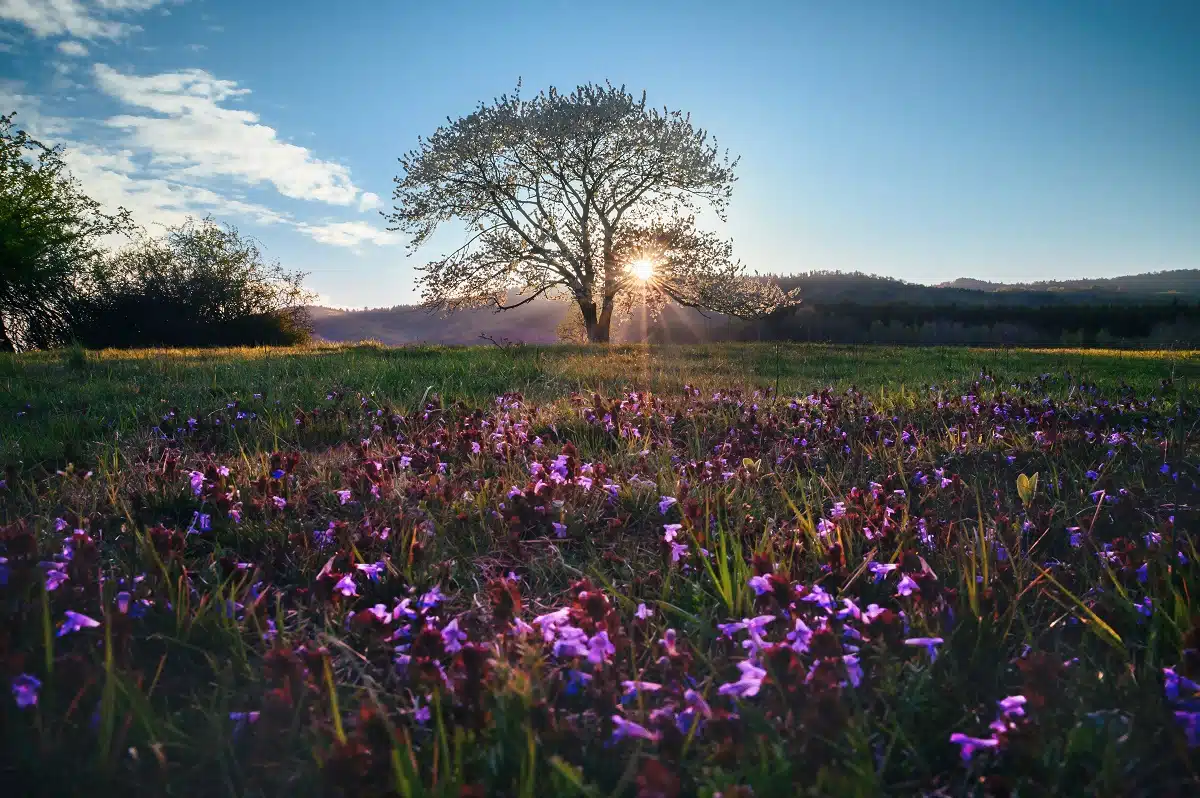
“Easter Morn” by Mary Baker Eddy
Gently thou beckonest from the giant hills
The new-born beauty in the emerald sky,
And wakening murmurs from the drowsy rills—
O gladsome dayspring! ‘reft of mortal sigh
To glorify all time—eternity—
With thy still fathomless Christ-majesty.
E’en as Thou gildest gladdened joy, dear God,
Give risen power to prayer; fan Thou the flame
Of right with might; and midst the rod,
And stern, dark shadows cast on Thy blest name,
Lift Thou a patient love above earth’s ire,
Piercing the clouds with its triumphal spire.
While sacred song and loudest breath of praise
Echo amid the hymning spheres of light,—
With heaven’s lyres and angels’ loving lays,
Send to the loyal struggler for the right,
Joy—not of time, nor yet by nature sown,
But the celestial seed dropped from Love’s throne.
Prolong the strain “Christ risen!” Sad sense, annoy
No more the peace of Soul’s sweet solitude!
Deep loneness, tear-filled tones of distant joy,
Depart! Glad Easter glows with gratitude—
Love’s verdure veils the leaflet’s wondrous birth—
Rich rays, rare footprints on the dust of earth.
Not life, the vassal of the changeful hour,
Nor burdened bliss, but Truth and Love attest
The solemn splendor of immortal power,—
The ever Christ, and glorified behest,
Poured on the sense which deems no suffering vain
That wipes away the sting of death—sin, pain.
“Easter Day” by John Keble
Oh! day of days! shall hearts set free
No “ministrel rapture,” find for thee!
Thou art the Sun of other days,
They shine by giving back thy rays:
Enthroned in thy sovereign sphere
Thou shedd’st thy light on all the year:
Sundays by thee more glorious break,
An Easter Day in every week:
And week-days, following in their train,
The fulness of thy blessing gain,
Till all, both resting and employ,
Be one Lord’s day of holy joy.
Then wake, my soul, to high desires,
And earlier light thine altar fires:
The world some hours is on her way,
Nor thinks on thee, thou blessed day:
Or if she think, it is in scorn:
The vernal light of Easter morn
To her dark gaze no brighter seems
Than Reason’s or the Law’s pale beams.
“Where is your Lord?” she scornful asks;
“Where is His hire? we know His tasks;
Sons of a King ye boast to be;
Let us your crowns and treasures see.”
We in the words of Truth reply
(An Angel brought them from the sky),
“Our Crown, our treasure is not here,
’Tis stored above the highest sphere:
“Methinks your wisdom guides amiss,
To seek on earth a Christian’s bliss;
We watch not now the lifeless stone;
Our only Lord is risen and gone.”
Yet even the lifeless stone is dear,
For thoughts of Him who late lay here;
And the base world, now Christ hath died,
Ennobled is and glorified.
No more a charnel-house, to fence
The relics of lost innocence,
A vault of ruin and decay;—
Th’ imprisoning stone is roll’d away:
’Tis now a cell, where Angels use
To come and go with heavenly news,
And in the ears of mourners say,
“Come see the place where Jesus lay:”
’Tis now a fane where Love can find
Christ everywhere embalm’d and shrin’d;
Aye gathering up memorials sweet,
Where’er she sets her duteous feet.
Oh! joy to Mary first allowed,
When roused from weeping o’er His shroud,
By His own calm, soul-soothing tone,
Breathing her name, as still His own!
Joy to the faithful Three renew’d,
As their glad errand they pursued!
Happy, who so Christ’s words convey,
That He may meet them on their way!
So is it still: to holy tears,
In lonely hours, Christ risen appears:
In social hours, who Christ would see,
Must turn all tasks to Charity.
“An Easter Ode” by Henry Alford
The calm of blessed night
Is on Judæa’s hills;
The full-orbed moon with cloudless light
Is sparkling on their rills:
One spot above the rest
Is still and tranquil seen,
The chamber as of something blest,
Amidst its bowers of green.
Around that spot each way
The figures ye may trace
Of men-at-arms in grim array,
Girding the solemn place:
But other bands are there—
And, glistening through the gloom,
Legions of angels bright and fair
Throng to that wondrous tomb.
“Praise be to God on high!
The triumph-hour is near:
The Lord hath won the victory,
The foe is vanquished here!
Dark grave, yield up the dead;
Give up thy prey, thou earth:
In death he bowed his sacred head—
He springs anew to birth!
“Sharp was the wreath of thorns
Around his suffering brow;
But glory rich his head adorns,
And angels crown him now.
Roll yonder rock away
That bars the marble-gate;
And gather we in bright array
To swell the Victor’s state!
“Hail, hail, hail!
The Lord is risen indeed!
The curse is made of none avail;
The sons of men are freed!”
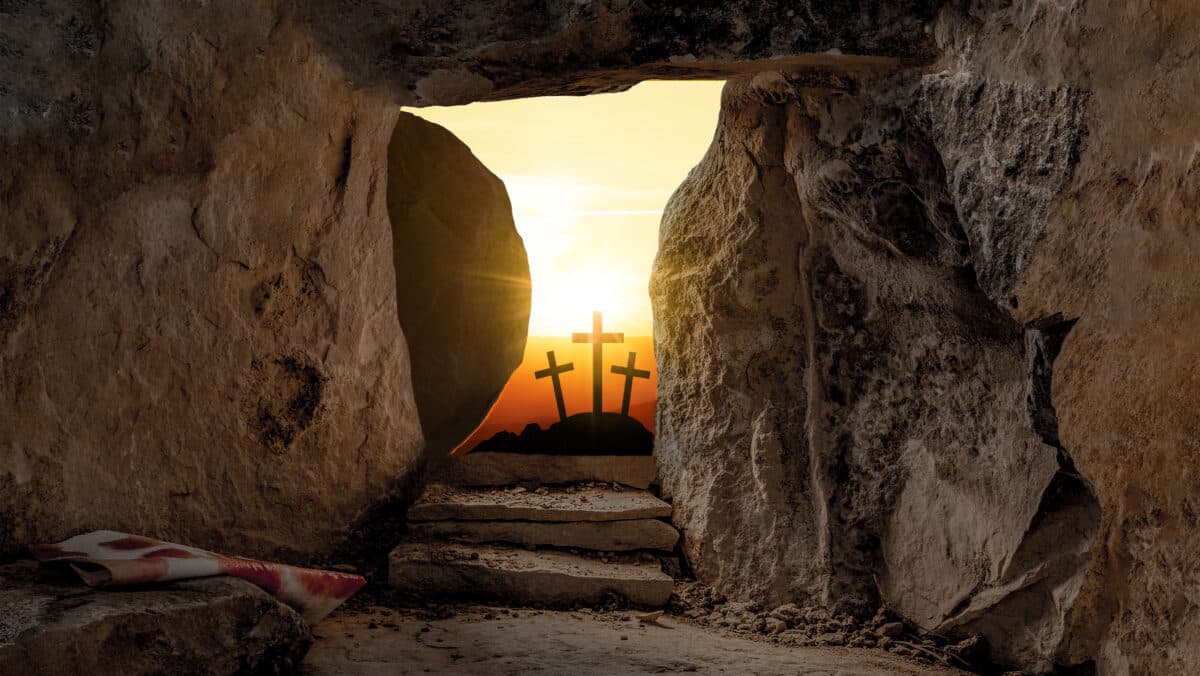
“Who Will Roll Away The Stone?” by Thomas Toke Lynch
“Who will roll away the stone?
We are few and are alone,”
Say the women, sad and weak;
“Who will give the help we seek?”
Thus in whispers low they talk,
Sighing on their early walk,
Of the work that has been done
Ere the rising of the sun.
Who will climb into the sky,
Bring redemption from on high?
Who will light the dreary grave,
And the dead and dying save?
All is done that thou wouldst do;
All is finished, soul for you;
Life is born, and death is dead,
Day is shining, night has fled.
“Christ Coming Forth From The Tomb” by Thomas Toke Lynch
Come forth with twice anointed feet,
And head that waits a second crown,
Thou art more living than the love
Of those who gently laid Thee down!
Pain is their life, thy grave their cross,
They grieve, they sigh, they faint for Thee;
Come forth, and make time’s bitterest loss
The joy of their eternity.
Sinner and saint have loved Thee well;
With ointment pure and purer yet,
They have anointed Thee, thy feet
With heaviest rain of tears were wet:
The sinner wept away her sins,
The saint held cheap her costly gift;
Arise, Thou lover of both, and each
To heaven and higher heaven lift.
Crowned but with thorns, thy timid friends
Who found Thee where to lay thy head,
From secret into open love
Arose at once when Thou wert dead;
With blood-anointed brow come forth,
And wear thy shining second crown;
Then into gentleness shall rise
The world that roughly cast Thee down.
From “Easter” by Geneviéve M. J. Irons
Deep in yon garden shade
The Life of all is laid
In death’s calm sleep;
Armed soldiers waiting near,
Amazed and full of fear,
Their vigil keep.
Angels, and stars, and the fair moon above,
Look down in silent awe and reverent love.
Through the dark cypress-trees
The gentle midnight breeze
Sighs a low wail;
Breath from the dewy ground
O’er the green earth around
Spreads a soft veil;
Each glade and valley, mountain, dale and hill,
Echoes the solemn whisper, “Peace, be still.”
Hushed Nature sinks to rest,
And on her Maker’s breast
She falls asleep;
Released from human woes
The Almighty finds repose
In slumber deep;
But saints are watching through the silent night,
In eager patience waiting for the light.
The mother undefiled
Is pondering on her Child,
Now crucified;
And through her tearless dreams
The cross in radiance beams,
Whereon he died.
Bright visions dawn. Behold! the darkness flies,
Resplendent from the grave she sees him rise.
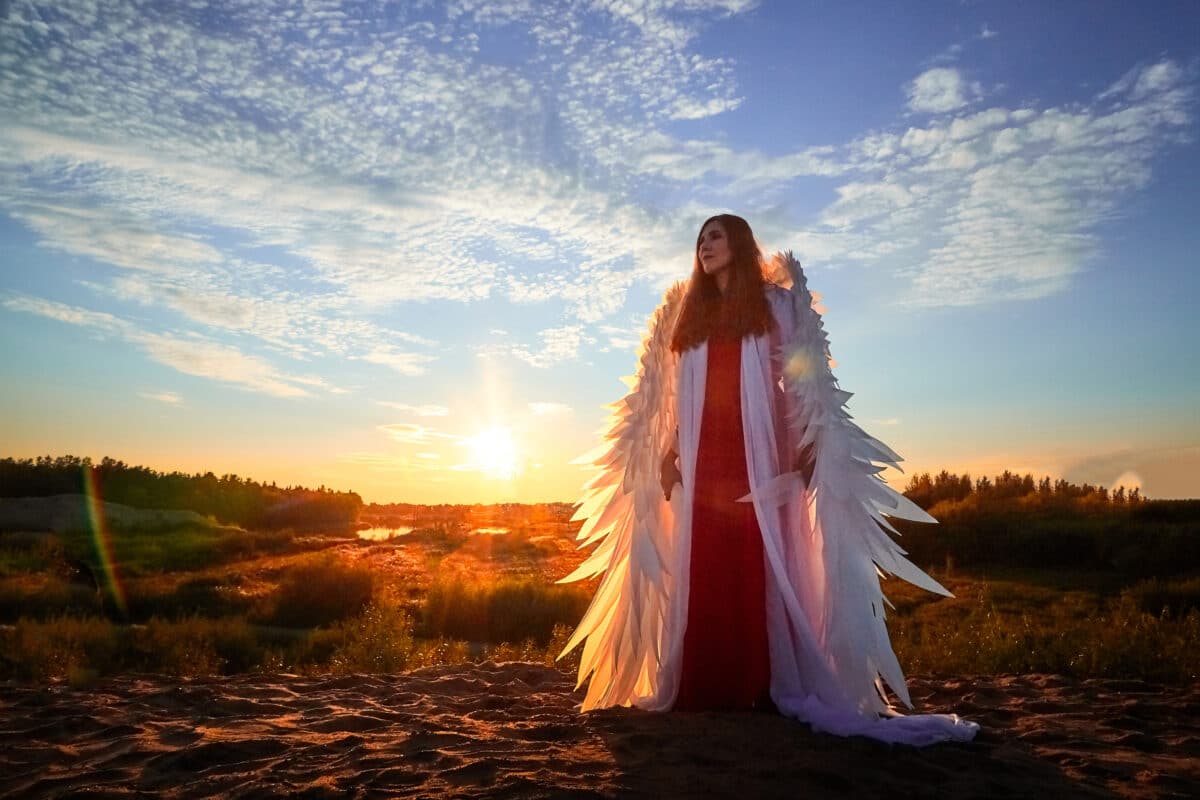
“The Angels at the Sepulchre” by Thomas Toke Lynch
The glory of God from the way of the East
Shines into the sepulchre, slumber has ceased;
The stone, like a cloud, has moved lightly away,
And on it there sits a strong angel of day.
Seize and bind him, ye soldiers,—he sits on the stone:
Not before him a bar, but beneath him a throne;
Bedazzled and smit with his terrible light,
They tremble, they fly, and they fall in their flight.
O, ring, bells of heaven; ye throngs of the blest,
Again hallelujahs may swell from your breast;
Let surges of music, like summer seas bright,
Re-ëcho and roll through the heavenly height.
They hated and sent Him in darkness to dwell
Beneath the great mountains and billows of hell;
But He lighted the caverns of ancient despair,
And with a new chain bound the fiend in his lair.
He’s at liberty set who so sorely was bruised;
He triumphs to-day whom the people refused:
Of all that have loved Him he’ll comfort the soul,
Now his own wounded heart is for ever made whole.
And, O, ye kind angels, who grieved for your song,
Sing anew, for the right has prevailed o’er the wrong;
The best of good-will shines through hatred and pain
And glory and peace have arisen to reign.
“Easter Hymn” by Arthur Penrhyn Stanley
Christ is risen! He is not here
Chain’d within our earthly sphere;
As in garb of flesh before,
Henceforth know we Him no more.
Christ is risen! Cross and tomb
Sink behind in passing gloom!
From these shadows drear and dim,
We must rise and live with Him.
Christ is risen! Our life-long sorrow
Fades before a brighter morrow.
For a time our courses sever,
Soon to be rejoin’d for ever.
Christ is risen! The truth that died
Mock’d and scourged and crucified,
Will unquestion’d mount on high,
Next to God’s own majesty.
Christ is risen! Deep within
Every charnel-house of sin
Lives a spark, which yet may shine
Radiant with a life divine.
Christ is risen! The things of earth
Lose their power and change their worth,
As we soar to things above—
Cloudless light and boundless Love.
Christ is risen! Lo, all is new,
Hail the coming Good and True!
From the old world’s weight releas’d,
Therefore let us keep the Feast.
Keep the feast with mind sincere
Conscience as the noontide clear,
Heart untouch’d by falsehood’s leaven,
Free-born citizens of heaven.
“An Easter Hymn” by Thomas Blackburne
Awake, thou wintry earth,
Fling off thy sadness;
Fair vernal flowers laugh forth
Your ancient gladness:
Christ is risen.
Wave, woods, your blossoms all,
Grim Death is dead;
Ye weeping funeral trees,
Lift up your head.
Christ is risen.
Come, see, the graves are green;
It is light; let us go
Where our loved ones rest
In hope below.
Christ is risen.
All is fresh and new,
Full of spring and light;
Wintry heart, why wearest the hue
Of sleep and night?
Christ is risen.
Leave thy cares beneath,
Leave thy worldly love;
Begin the better life
With God above.
Christ is risen.
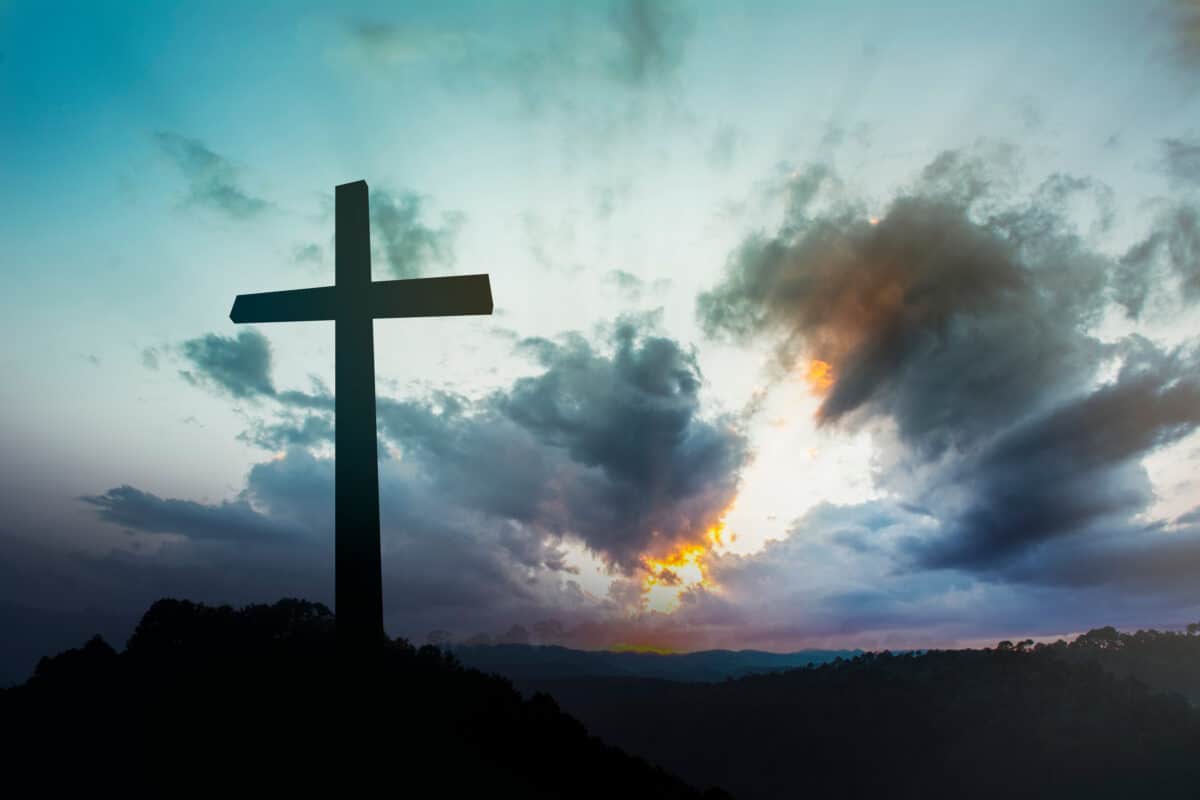
“The Day of Resurrection” by St. John of Damascus (John Mason Neale, Translator)
’Tis the day of resurrection,—
Earth, tell it out abroad,—
The passover of gladness,
The passover of God.
From death to life eternal,
From this world to the sky,
Our Christ hath brought us over
With hymns of victory.
Our hearts be pure from evil,
That we may see aright
The Lord in rays eternal
Of resurrection-light,
And, listening to his accents,
May hear, so calm and plain,
His own “All hail!” and, hearing,
May raise the victor-strain.
Now let the heavens be joyful,
Let earth her song begin,
Let the round world keep triumph
And all that is therein,
Invisible and visible,
Their notes let all things blend;
For Christ the Lord hath risen,
Our joy that hath no end.
Poems About Reflections on the Resurrection
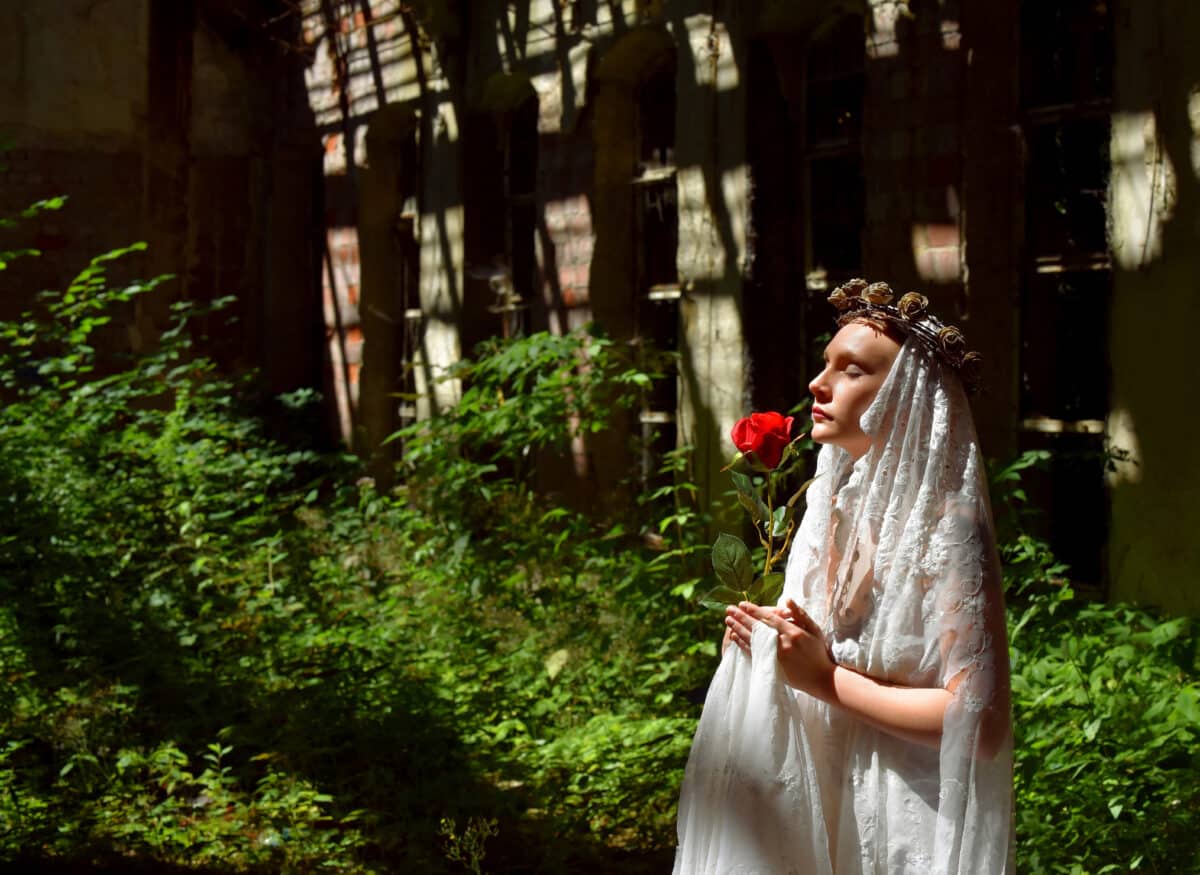
“Resurrection” by Sidney Lanier
Sometimes in morning sunlights by the river
Where in the early fall long grasses wave,
Light winds from over the moorland sink and shiver
And sigh as if just blown across a grave.
And then I pause and listen to this sighing.
I look with strange eyes on the well-known stream.
I hear wild birth-cries uttered by the dying.
I know men waking who appear to dream.
Then from the water-lilies slow uprises
The still vast face of all the life I know,
Changed now, and full of wonders and surprises,
With fire in eyes that once were glazed with snow.
Fair now the brows old Pain had erewhile wrinkled,
And peace and strength about the calm mouth dwell.
Clean of the ashes that Repentance sprinkled,
The meek head poises like a flower-bell.
All the old scars of wanton wars are vanished;
And what blue bruises grappling Sense had left
And sad remains of redder stains are banished,
And the dim blotch of heart-committed theft.
O still vast vision of transfigured features
Unvisited by secret crimes or dooms,
Remain, remain amid these water-creatures,
Stand, shine among yon water-lily blooms.
For eighteen centuries ripple down the river,
And windy times the stalks of empires wave,
—Let the winds come from the moor and sigh and shiver,
Fain, fain am I, O Christ, to pass the grave.
“God In Nature And Grace” by Anonymous
God is love; the heavens tell it
Through their glorious orbs of light,
In that glad and golden language
Speaking to us day and night,
Their great story,
God is love, and God is light.
And the teeming earth rejoices
In that message from above,
With ten thousand thousand voices
Telling back , from hill and grové,
Her glad story ,
God is might, and God is love.
Through these anthems of creation,
Struggling up with gentle strife,
Christian songs of Christ’s salvation
To the world , with blessings rife,
Tell their story,
God is love, and God is life.
Up to Him let each affection
Duly rise, and round Him move;
Our whole lives one resurrection
To the life of life above;
Our glad story,
God is life, and God is love.
“Divine Order” by Horatius Bonar
‘Tis first the true and then the beautiful,
Not first the beautiful and then the true;
First the wild moor, with rock and reed and pool,
Then the gay garden, rich in scent and hue.
‘Tis first the good and then the beautiful,
Not first the beautiful and then the good;
First the rough seed, sown in the rougher soil,
Then the flower-blossom , or the branching wood.
Not first the glad and then the sorrowful,—
But first the sorrowful, and then the glad;
Tears for a day, —for earth of tears is full,
Then we forget that we were ever sad.
Not first the bright , and after that the dark,
But first the dark, and after that the bright;
First the thick cloud, and then the rainbow’s arc,
First the dark grave, then resurrection-light .
‘Tis first the night , —stern night of storm and war,
Long nights of heavy clouds and veiled skies;
Then the far sparkle of the Morning-star,
That bids the saints awake and dawn arise.
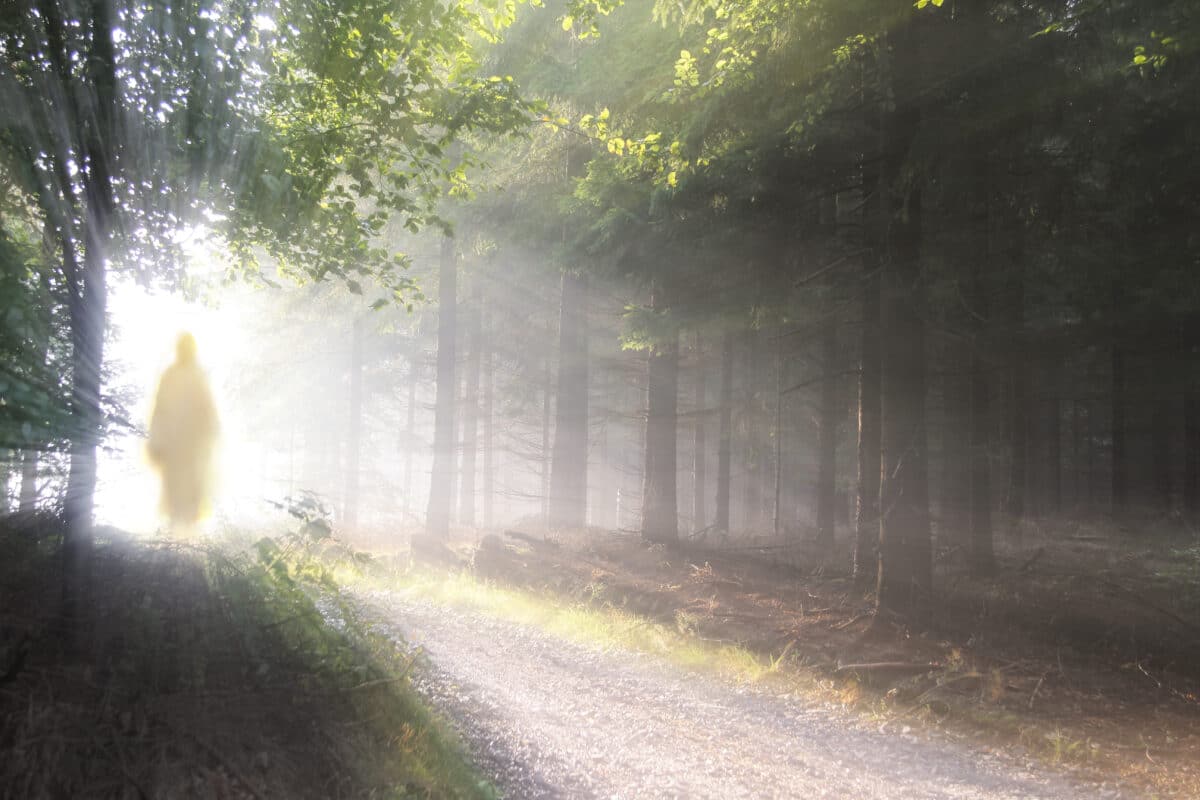
“The Second Resurrection” by James Montgomerie
The wheat is gather’d, and the tares are left,
Bound up in bundles for devouring flame;
The gay adult’ress and her slaves, bereft
Of every hiding place-stripp’d, in their shame
Are dragg’d forth from the grave, in cowering crowds,
To meet their injur’d Sovereign in the clouds.
The second awful Resurrection must
Take place amidst a flaming earth and sky;
The trump of God shall waken the unjust
To their sad doom-” still dying thou shalt die;”
The body rais’d, more fierce than when it fell,
Shall swallow up the soul and be its hell.
From their undying tombs the frighten’d ghosts
Shall strive to break, and, striving, still rebel;
Themselves the inner prisons, where the hosts
That with the first apostate spirit fell,
Shall be eternally in chains confin’d,
From the pure universe of holy mind.
Not all the dismal dungeons of the past,
Where brave men fainted in the horrid gloom,
Can match those fire-proof prisons which at last
Shall rise from out the reprobate’s foul tomb;
Each binding each, while in each hatred reigns,
And all, in dying anguish, gnaw their chains!
Still writhing under black Gilboa’s curse,
Where dew shall never fall, and never fell;
Both men and devils shall grow worse and worse,
He will not make men gods and they rebel
Each spirit pines in secret, and alone,
As pines the toad within the ribs of stone.
And he who leap’d into the throne of light,
And bade the King of glory bend the knee,
Low lies in depth of death’s eternal night,
In blood of murder’d worlds-a dreadful sea,
Which must in endless wrath and fury roll
Its surging billows o’er his guilty soul.
Bound by the chains which his own fingers forg’d,
He crept into the soul-God shut him in;
The subtle serpent quick his prey disgorg’d,
But both the hook held fast-presumptuous sin
They twisted round God’s dark decree-the line
And thus eternally must twist and twine
The weeds wrapp’d round his head, yet fill’d with spite,
Shut in the meanest earthly imbecile,
Too proud to yield-too impotent to fight—
The sea without, the soul within a-boil,
His sceptre broken, and his glory gone,
He, as a cur the moon bays, bays the throne.
Sleeper, awake from thy voluptuous dream!
Hark to the roaring of the ruthless sea,
Where thou shalt gasp, and agonise, and scream,
When the wild waters gather over thee;
When death’s cold dew breathes on thy ghastly brow,
Thou shalt arise and pray-then why not now?
Turn, turn, poor wanderer, ere thy weary feet
Stumble on those dark mountains on before;
Say, silly thing, art thou prepar’d to meet
The sea of wrath which the dear Kinsman bore, —
And through the long, eternal, sleepless night,
Pay to an angry God the utmost mite ?
O, hear me world! ’tis God Almighty speaks,
With loving voice, through me, a dying worm;
Infernal eagles whet their gory beaks,
To tear thy carcase in the coming storm,
When thou shalt gnash thy teeth with horror dumb,
O, rise and flee-flee from the Wrath TO COME.
From “Easter Flowers” by Mary Bissell Waterman
“Go forth , O beloved, and find them,
Your hearts with pure love all aglow;
E’en the lowliest flower that fades in an hour
The Lord’s resurrection may show.”
The great congregation departed;
The flowers looked around in surprise.
“And must we stay here ” said the rose, while a tear
Bedimmed yellow daffodil’s eyes.
“I think we’ve a message to carry,”
Was the heliotrope’s gentle reply,
“But how can we know to what places to go?”
Said the gay little pink, with a sigh.
A flutter , a rustle, a whisper,
A step light and fleet as a fawn ,
And, behold! standing close by the royal red rose
Was a child with a face like the dawn.
The flowers are first cousins to children,
The angels to both are akin,
And without spoken word all the bright blossoms heard
Where the dear little maiden had been.
“The Resurrection” by Giacomo Leopardi
I thought I had forever lost,
Alas, though still so young,
The tender joys and sorrows all,
That unto youth belong;
The sufferings sweet, the impulses
Our inmost hearts that warm;
Whatever gives this life of ours
Its value and its charm.
What sore laments, what bitter tears
O’er my sad state I shed,
When first I felt from my cold heart
Its gentle pains had fled!
Its throbs I felt no more; my love
Within me seemed to die;
Nor from my frozen, senseless breast
Escaped a single sigh!
I wept o’er my sad, hapless lot;
The life of life seemed lost;
The earth an arid wilderness,
Locked in eternal frost;
The day how dreary, and the night
How dull, and dark, and lone!
The moon for me no brightness had,
No star in heaven shone.
And yet the old love was the cause
Of all the tears I shed;
Still in my inmost breast I felt
The heart was not yet dead.
My weary fancy still would crave
The images it loved,
And its capricious longings still
A source of sorrow proved.
But e’en that lingering spark of grief
Was soon within me spent,
And I the strength no longer had
To utter a lament.
And there I lay, stunned, stupefied,
Nor asked for comfort more;
My heart to hopeless, blank despair
Itself had given o’er.
How changed, alas, was I from him
Who once with passion thrilled,
Whose ardent soul was ever, once,
With sweet illusions filled!
The swallow to my window, still,
Would come, to greet the dawn;
But his sweet song no echo found
In my poor heart, forlorn.
Nor pleased me more, in autumn gray,
Upon the hill-side lone,
The cheerful vesper-bell, or light
Of the departing sun.
In vain the evening star I saw
Above the silent vale,
And vainly warbled in the grove
The plaintive nightingale.
And you, ye furtive glances, bright,
From gentle eyes that rove,
The sweet, the gracious messages
Of first immortal Love;
The soft, white hand, that tenderly
My own hand seemed to woo;
All, all your magic spells were vain,
My torpor to subdue.
Of every pleasure quite bereft,
Sad but of tranquil mien;
A state of perfect littleness,
Yet with a face serene;
Save for the lingering wish, indeed,
In death to sink to rest,
The force of all desire was spent
In my exhausted breast.
As some poor, feeble wanderer,
With age and sorrow bent,
The April of my years, alas,
Thus listlessly I spent;
Thus listlessly, thus wearily,
Didst thou consume, O heart,
Those golden days, ineffable,
So swiftly that depart.
Who, from this heavy, heedless rest
Awakens me again?
What new, what magic power is this,
I feel within me reign?
Ye motions sweet, ye images,
Ye throbs, illusions blest,
Ah, no,—ye are not then shut out
Forever from this breast?
The glorious light of golden days
Do ye again unfold?
The old affections that I lost,
Do I once more behold?
Now, as I gaze upon the sky,
Or on the verdant fields,
Each thing with sorrow me inspires,
And each a pleasure yields.
The mountain, forest, and the shore
Once more my heart rejoice;
The fountain speaks to me once more,
The sea hath found a voice.
Who, after all this apathy,
Restores to me my tears?
Each moment, as I look around,
How changed the world appears!
Hath hope, perchance, O my poor heart,
Beguiled thee of thy pain?
Ah, no, the gracious smile of hope
I ne’er shall see again.
Nature bestowed these impulses,
And these illusions blest;
Their inborn influence, in me,
By suffering was suppressed;
But not annulled, not overcome
By cruel blows of Fate;
Nor by the inauspicious frown
Of Truth, importunate!
I know she has no sympathy
For fond imaginings;
I know that Nature, too, is deaf,
Nor heeds our sufferings;
That for our good she nothing cares,
Our being, only heeds;
And with the sight of our distress
Her wild caprices feeds.
I know the poor man pleads in vain,
For others’ sympathy;
That scornfully, or heedlessly,
All from his presence flee;
That both for genius and for worth,
This age has no respect;
That all who cherish lofty aims
Are left to cold neglect.
And you, ye eyes so tremulous
With lustre all divine,
I know how false your splendors are,
Where no true love doth shine.
No love mysterious and profound
Illumes you with its glow;
Nor gleams one spark of genial fire
Beneath that breast of snow.
Nay, it is wont to laugh to scorn
Another’s tender pain;
The fervent flame of heavenly love
To treat with cold disdain.
Yet I with thankfulness once more
The old illusions greet,
And feel, with shock of pleased surprise,
The heart within me beat.
To thee alone this force renewed,
This vital power I owe;
From thee alone, my faithful heart,
My only comforts flow.
I feel it is the destiny
Of every noble mind,
In Fate, in Fortune, Beauty, and the World,
An enemy to find:
But while thou liv’st, nor yield’st to Fate,
Contending without fear,
I will not tax with cruelty
The power that placed me here.

“The Innocents” by Arthur Cleveland Coxe
1.
Reading the stones that marked a field of death,
I heard a sigh, as ‘ mid the mounds I trod:
It seem’d to say-as ‘ twere with sobbing breath—
My heart is buried here, O Christ, my God !
2.
A mother by a new-made bed that knelt,
I saw—and turned my steps with rev’rent fear;
Yet lingering in the church-yard walks, I felt,
Dear Lord ! how many hearts are hoarded
here.
3.
How many buds and blossoms of the spring,
By frosts too early nipp’d, lie thickly strown;
Or like the swallows oft, on eager wing,
That come untimely and too soon are flown.
4.
Yet ‘neath these heaps of buried hopes that tell
Are sown not less the seeds of life’s return :
God’s ore is treasured in each narrow cell,
Where gold refines and only dross can burn.
5.
Oh! weep not, mother, o’er that bed of love
Where innocence awaits the trumpet’s sound,
While many a mother mourns her dead above
And weeps no more for children under ground.
6.
But come this way when holy hymns are sung,
And sounds the air with Paschal-anthems rife,
To charge with notes of joy thy plaintive tongue,
And sing the Resurrection and the Life.
7.
For sweetly sleeps the chrisom-child at rest,
And fain with such the Christian heart would lie!
If so God wills-of all His gifts ‘ tis best,
Fresh from the font, in Christ new-born, to die.
From “Rhoda” by Arthur Cleveland Coxe
1.
Sweet Paschal Rose, thy fragrant name
Blossoms in all the golden flame
Of that blest Easter Morn,
When Peter, from the bonds abhorr’d
Of Herod and his threatened sword,
Rose glorious, like His risen Lord,
To light and life new-born.
2.
Dark was the Paschal Eve, that year,
When met the trembling saints in fear,
All night for him to pray.
The great apostle, doom’d to die,
Though soaring where the angels fly,
Must leave the flock forlorn to sigh,
Ev’n on an Easter- Day.
3.
Meanwhile, in prison-bonds he slept,
Peaceful-yet dreaming that he wept.
Once more his shameful fall:
“Dear Master, ” in his dream, said he,”
‘My oath, at last, redeemed shall be;
In chains and death I follow Thee;
My sin-forgive it all!”
“The Wreath” by Dora Sigerson Shorter
Here on my path by some hard fate struck down,
When life at last held out full hands to me.
When the great dreams of younger years awoke
And dear, dead voices whispered ” Liberty.”
Ah, cruel blow, from which I stricken rise
And blindly stagger for that path again,
To wonder if ’tis worth the striving now,
Thus robbed upon life’s highway and half slain.
Here I awoke to fear again the dead,
Whose tender faces held me as I slept.
Ah, well I knew whojeaned above me there,
Into whose arms so pitifully I crept.
And I awoke, for Spring did cry, “
Arise, For birds within the green woods carol clear.”
Then Easter came with wreath of lilies pale,
Placed on my heart the grief of yester-year.
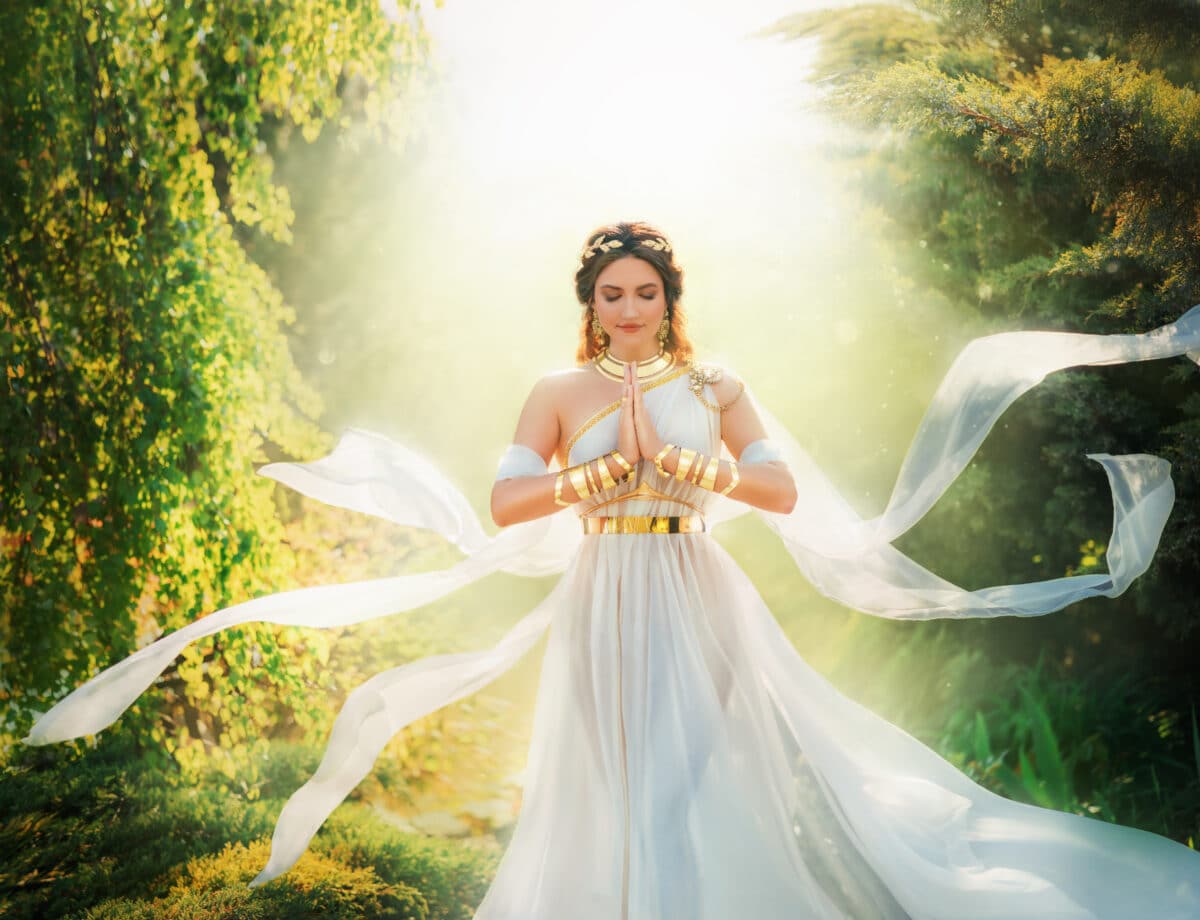
From “Summer Studies” by Harriet Beecher Stowe
Now is that glorious resurrection time
When all earth’s buried beauties have new birth:
Behold the yearly miracle complete,—
God hath created a new heaven and earth!
No tree that wants its joyful garments now,
No flower but hastes his bravery to don;
God bids thee to this marriage feast of joy,
Let thy soul put the wedding garment on.
“Hours Of The Night: II. First Hour” by Harriet Beecher Stowe
That cry hath stirred the deadness of my soul;
I feel a heart-string throb, as throbs a chord
When breaks the master chord of some great harp;
My heart responsive answers, “Why?” O Lord.
O cross of pain! O crown of cruel thorns!
O piercing nails! O spotless Sufferer there!
Wert thou forsaken in thy deadly strife?
Then canst thou pity me in my despair.
Take my dead heart, O Jesus, down with thee
To that still sepulchre where thou didst rest;
Lay it in the fair linen’s spicy folds,
As a dear mother lays her babe to rest.
I am so worn, so weary, so o’erspent,
To lie with thee in that calm trance were sweet;
The bitter myrrh of long-remembered pain
May work in me new strength to rise again.
This dark and weary mystery of woe,
This hopeless struggle, this most useless strife,—
Ah, let it end! I die with thee, my Lord,
To all I ever hoped or wished from life.
I die with thee: thy fellowship of grief,
Thy partnership with mortal misery,
The weary watching and the nameless dread,—
Let them be mine to make me one with thee.
Thou hast asked, “Why?” and God will answer thee,
Therefore I ask not, but in peace lie down,
For the three days of mystery and rest,
Till comes the resurrection and the crown.
“Mary Seeth Two Angels Sitting” by Walter Chalmers Smith
Angels twain were sitting
In the vacant tomb;
Lights of day were flitting
Through its silent gloom;
Angels brightly shining,
Light of common day,
Mingling and entwining
Where the Saviour lay.
Often in our sorrow
Angels may be seen,
When we look to-morrow
Where our griefs had been;
And the angels holy
Whisper us and say,
Lo! the Meek and Lowly
Plucked the sting away.
Sweet is all the bitter,
Blessed is the night,
When the angels glitter
In the morning light,
To the common duty
Bidding us away,
For Jesus in His beauty
Will meet us by the way.
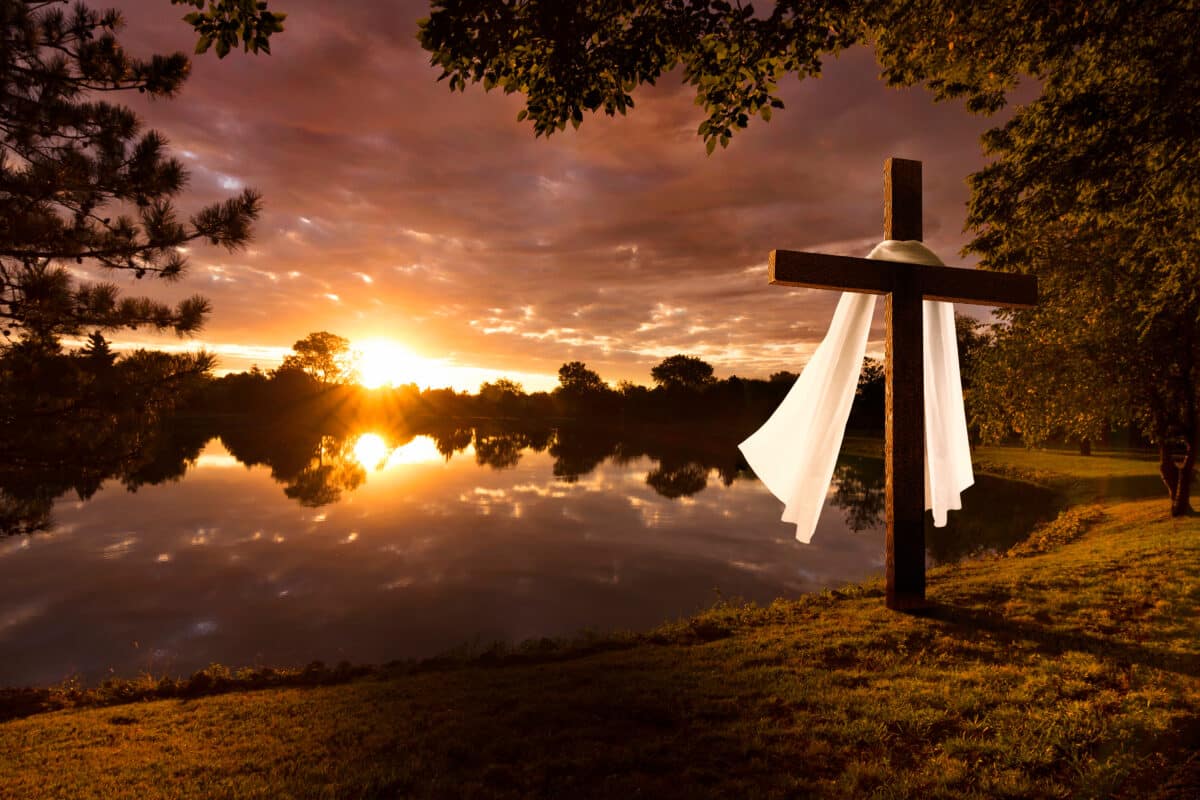
“Resurrection” by Hermann Hagedorn
Not long did we lie on the torn, red field of pain.
We fell, we lay, we slumbered, we took rest,
With the wild nerves quiet at last, and the vexed brain
Cleared of the wingèd nightmares, and the breast
Freed of the heavy dreams of hearts afar.
We rose at last under the morning star.
We rose, and greeted our brothers, and welcomed our foes.
We rose; like the wheat when the wind is over, we rose.
With shouts we rose, with gasps and incredulous cries,
With bursts of singing, and silence, and awestruck eyes,
With broken laughter, half tears, we rose from the sod,
With welling tears and with glad lips, whispering, “God.”
Like babes, refreshed from sleep, like children, we rose,
Brimming with deep content, from our dreamless repose.
And, “What do you call it?” asked one. “I thought I was dead.”
“You are,” cried another. “We’re all of us dead and flat.”
“I’m alive as a cricket. There’s something wrong with your head.”
They stretched their limbs and argued it out where they sat.
And over the wide field friend and foe
Spoke of small things, remembering not old woe
Of war and hunger, hatred and fierce words.
They sat and listened to the brooks and birds,
And watched the starlight perish in pale flame,
Wondering what God would look like when He came.
“The Resurrection” by Giles Fletcher
But now the second morning from her bow’r
Began to glister in her beams, and now
The roses of the day began to flow’r
In th’ eastern garden; for heav’n’s smiling brow
Half insolent for joy, began to show;
The early sun came lively dancing out,
And the brag lambs ran wantoning about,
That heav’n and earth might seem in triumph both to shout.
Say, earth, why hast thou got thee new attire,
And stick’st thy habit full of daisies red!
Seems that thou dost to some high thought aspire,
And some new-found-out bridegroom mean’st to wed:
Tell me, ye trees, so fresh apparelled,—
So never let the spiteful canker waste you,
So never let the heav’ns with lightning blast you,—
Why go you now so trimly drest, or whither haste you?
Answer me, Jordan, why thy crooked tide
So often wanders from his nearest way,
As though some other way thy stream would slide,
And fain salute the place where something lay.
And you, sweet birds, that shaded from the ray
Sit carolling and piping grief away,
The while the lambs to hear you dance and play,
Tell me, sweet birds, what is it you so fain would say?
Ye primroses and purple violets,
Tell me, why blaze ye from your leavy beds,
And woo men’s hands to rend you from your sets,
As though you would somewhere be carried,
With fresh perfumes, and velvets garnished?
But ah! I need not ask, ’tis surely so,
You all would to your Saviour’s triumph go,
There would ye all await, and humble homage do.
From “The Shadow And The Light” by John Greenleaf Whittier
Our weakness is the strength of sin,
But love must needs be stronger far,
Outreaching all and gathering in
The erring spirit and the wandering
A Voice grows with the growing years;
Earth, hushing down her bitter cry,
Looks upward from her graves, and hears,
“The Resurrection and the Life am I.”
O Love Divine!—whose constant beam
Shines on the eyes that will not see,
And waits to bless us, while we dream
Thou leavest us because we turn from thee!

From “Good Friday” by John Keble
Is it not strange, the darkest hour
That ever dawned on sinful earth
Should touch the heart with softer power
For comfort than an angel’s mirth?
That to the Cross the mourner’s eye should turn
Sooner than where the stars of Christmas burn?
Sooner than where the Easter sun
Shines glorious on yon open grave,
“Who died to heal, is risen to save?”
Sooner than where upon the Saviour’s friends
The very Comforter in light and love descends?
Yet so it is: for duly there
The bitter herbs of earth are set,
Till tempered by the Saviour’s prayer,
And with the Saviour’s life-blood wet,
They turn to sweetness, and drop holy balm,
Soft as imprisoned martyr’s deathbed calm.
All turn to sweet—but most of all
That bitterest to the lip of pride,
When hopes presumptuous fade and fall,
Or Friendship scorns us, duly tried,
Or Love, the flower that closes up for fear
When rude and selfish spirits breathe too near.
Then like a long-forgotten strain
Comes sweeping o’er the heart forlorn
What sunshine hours had taught in vain
Of Jesus suffering shame and scorn,
As in all lowly hearts he suffers still,
While we triumphant ride and have the world at will.
“The Death Of Christ.” by Michelangelo di Lodovico Buonarroti Simoni
Not less elate than smitten with wild woe
To see not them but Thee by death undone,
Were those blest souls, when Thou above the sun
Didst raise, by dying, men that lay so low:
Elate, since freedom from all ills that flow
From their first fault for Adam’s race was won;
Sore smitten, since in torment fierce God’s son
Served servants on the cruel cross below.
Heaven showed she knew Thee, who Thou wert and whence,
Veiling her eyes above the riven earth;
The mountains trembled and the seas were troubled.
He took the Fathers from hell’s darkness dense:
The torments of the damn’d fiends redoubled:
Man only joyed, who gained baptismal birth.
Poems About Easter

“Passion Plowers and Easter Lilies.” by Mary Bissell Waterman
In this brief changing life of ours,
Mingling with sweet and fragrant flowers,
The Passion Flowers entwine ;
They speak of pain and bitter tears,
Of buried hopes, and fruitless years,
Of sweat of Blood Divine.
But when the purple clusters droop,
Behold the flowers that whisper Hope,
E’en by the stone sealed tomb;
For what in Life can bring despair
If close beside each grief and care
The Easter Lilies bloom?
“Easter” by Emily Pauline Johnson
Lent gathers up her cloak of sombre shading
In her reluctant hands.
Her beauty heightens, fairest in its fading,
As pensively she stands
Awaiting Easter’s benediction falling,
Like silver stars at night,
Before she can obey the summons calling
Her to her upward flight,
Awaiting Easter’s wings that she must borrow
Ere she can hope to fly –
Those glorious wings that we shall see to-morrow
Against the far, blue sky.
Has not the purple of her vesture’s lining
Brought calm and rest to all?
Has her dark robe had naught of golden shining
Been naught but pleasure’s pall?
Who knows? Perhaps when to the world returning
In youth’s light joyousness,
We’ll wear some rarer jewels we found burning
In Lent’s black-bordered dress.
So hand in hand with fitful March she lingers
To beg the crowning grace
Of lifting with her pure and holy fingers
The veil from April’s face.
Sweet, rosy April – laughing, sighing, waiting
Until the gateway swings,
And she and Lent can kiss between the grating
Of Easter’s tissue wings.
Too brief the bliss – the parting comes with sorrow.
Good-bye dear Lent, good-bye!
We’ll watch your fading wings outlined to-morrow
Against the far blue sky.
“Easter Bells” by Margaret Elizabeth Munson Sangster
Chime, solemn bells of Easter!
The shadows flee away,
And all the earth is smiling
In the glory of the day.
Ring, tender bells of Easter!
Beyond our toil and tears,
There wait for all the faithful
Heaven’s long and happy years.
Break, joyous bells of Easter!
From far across the sea
Bring us the endless music
Of immortality.
Triumphant bells of Easter!
Again by angels rung,
Speak comfort to the sorrowing
Of every land and tongue.
Blend, golden bells of Easter!
Heaven’s fairest and its best,
To hush earth’s clamorous discords
And soothe earth’s sad unrest.

“Easter” by Alfred Joyce Kilmer (Joyce)
The air is like a butterfly
With frail blue wings.
The happy earth looks at the sky
And sings.
“Easter” by Fannie Isabelle Sherrick
Let all the flowers wake to life;
Let all the songsters sing;
Let everything that lives on earth
Become a joyous thing.
Wake up, thou pansy, purple-eyed,
And greet the dewy spring;
Swell out, ye buds, and o’er the earth
Thy sweetest fragrance fling.
Why dost thou sleep, sweet violet?
The earth has need of thee;
Wake up and catch the melody
That sounds from sea to sea.
Ye stars, that dwell in noonday skies,
Shine on, though all unseen;
The great White Throne lies just beyond,
The stars are all between.
Ring out, ye bells, sweet Easter bells,
And ring the glory in;
Ring out the sorrow, born of earth–
Ring out the stains of sin.
O banners wide, that sweep the sky,
Unfurl ye to the sun;
And gently wave about the graves
Of those whose lives are done.
Let peace be in the hearts that mourn–
Let “Rest” be in the grave;
The Hand that swept these lives away
Hath power alone to save.
Ring out, ye bells, sweet Easter bells,
And ring the glory in;
Ring out the sorrow, born of earth–
Ring out the stains of sin.
“The Joy of Assurance” by Frances Ridley Havergal
It is too calm to be a dream,
Too gravely sweet, too full of power,
Prayer changed to praise this very hour!
Yes, heard and answered! though it seem
Beyond the hope of yesterday,
Beyond the faith that dared to pray,
Yet not beyond the love that heard,
And not beyond the faithful word
On which each trembling prayer may rest,
And win the answer truly best.
Yes , heard and answered! sought and found!
I breathe a golden atmosphere
Of solemn joy, and seem to hear
Within, above, and all around,
The chime of deep cathedral bells,
An early herald peal that tells
A glorious Easter tide begun;
While yet are sparkling in the sun
Large rain drops of the night storm passed,
And days of Lent are gone at last.
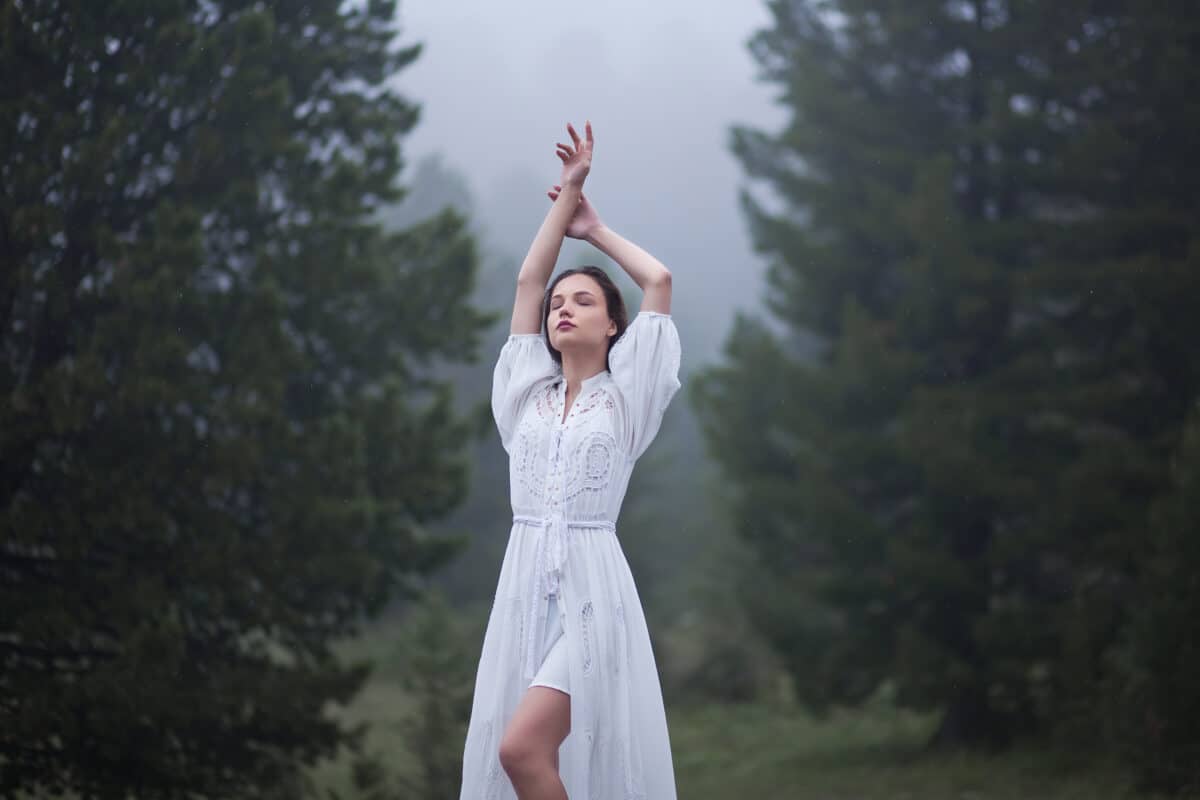
“Easter” by Susan Coolidge (Sarah Chauncey Woolsey)
When dawns on earth the Easter sun
The dear saints feel an answering thrill.
With whitest flowers their hands they fill;
And, singing all in unison,
Unto the battlements they press–
The very marge of heaven–how near!
And bend, and look upon us here
With eyes that rain down tenderness.
Their roses, brimmed with fragrant dew,
Their lilies fair they raise on high;
“Rejoice! The Lord is risen!” they cry;
“Christ is arisen; we prove it true!
“Rejoice, and dry those faithless tears
With which your Easter flowers are stained;
Share in our bliss, who have attained
The rapture of the eternal years;
“Have proved the promise which endures,
The Love that deigned, the Love that died;
Have reached our haven by His side–
Are Christ’s, but none the less are yours;
“Yours with a nearness never known
While parted by the veils of sense;
Infinite knowledge, joy intense,
A love which is not love alone,
“But faith perfected, vision free,
And patience limitless and wise–
Beloved, the Lord is risen, arise!
And dare to be as glad as we!”
We do rejoice, we do give thanks,
O blessed ones, for all your gain,
As dimly through these mists of pain
We catch the gleaming of your ranks.
We will arise, with zeal increased,
Blending, the while we strive and grope,
Our paler festival of Hope
With your Fruition’s perfect feast.
Bend low beloved, against the blue;
Lift higher still the lilies fair,
Till, following where our treasures are,
We come to join the feast with you.
From “Easter, 1916” by William Butler Yeats
I have met them at close of day
Coming with vivid faces
From counter or desk among grey
Eighteenth-century houses.
I have passed with a nod of the head
Or polite meaningless words,
Or have lingered awhile and said
Polite meaningless words,
And thought before I had done
Of a mocking tale or a gibe
To please a companion
Around the fire at the club,
Being certain that they and I
But lived where motley is worn:
All changed, changed utterly:
A terrible beauty is born.
“Easter” by William Henry Davies
What exultations in my mind,
From the love-bite of this Easter wind!
My head thrown back, my face doth shine
Like yonder Sun’s, but warmer mine.
A butterfly – from who knows where –
Comes with a stagger through the air,
And, lying down, doth ope and close
His wings, as babies work their toes:
Perhaps he thinks of pressing tight
Into his wings a little light!
And many a bird hops in between
The leaves he dreams of, long and green,
And sings for nipple-buds that show
Where the full-breasted leaves must grow.
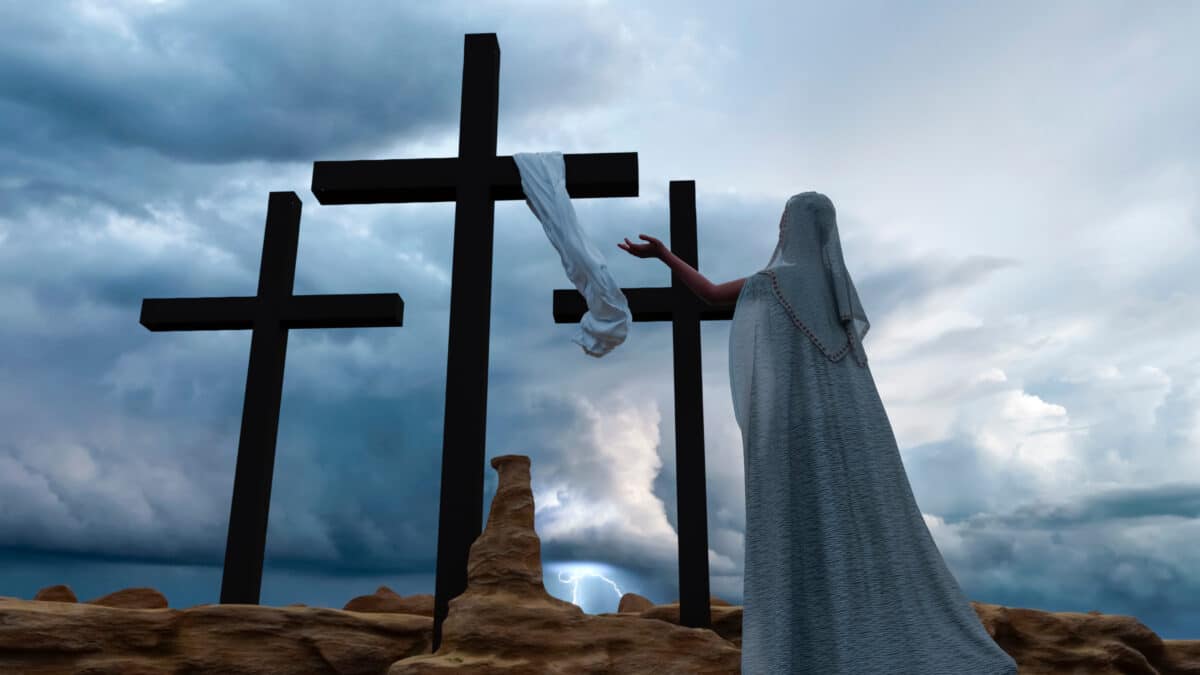
“Easter Day” by Oscar Fingal O’Flahertie Wills Wilde
The silver trumpets rang across the Dome:
The people knelt upon the ground with awe:
And borne upon the necks of men I saw,
Like some great God, the Holy Lord of Rome.
Priest-like, he wore a robe more white than foam,
And, king-like, swathed himself in royal red,
Three crowns of gold rose high upon his head:
In splendour and in light the Pope passed home.
My heart stole back across wide wastes of years
To One who wandered by a lonely sea,
And sought in vain for any place of rest:
‘Foxes have holes, and every bird its nest.
I, only I, must wander wearily,
And bruise my feet, and drink wine salt with tears.’
“Easter Eve” by Archibald Lampman
Hear me, Brother, gently met;
Just a little, turn, not yet,
Thou shalt laugh, and soon forget:
Now the midnight draweth near.
I have little more to tell;
Soon with hallow stroke and knell,
Thou shalt count the palace bell,
Calling that the hour is here.
Burdens black and strange to bear,
I must tell, and thou must share,
Listening with that stony stare,
Even as many a man before.
Years have lightly come and gone
In their jocund unison,
But the tides of life roll on—
They remember now no more.
Once upon a night of glee,
In an hour of revelry,
As I wandered restlessly,
I beheld with burning eye,
How a pale procession rolled
Through a quarter quaint and old,
With its banners and its gold,
And the crucifix went by.
Well I knew that body brave
That was pierced and hung to save,
But my flesh was now a grave
For the soul that gnashed within.
He that they were bearing by,
With their banners white and high,
He was pure, and foul was I,
And his whiteness mocked my sin.
Ah, meseemed that even he,
Would not wait to look on me,
In my years and misery,
Things that he alone could heal.
In mine eyes I felt the flame
Of a rage that naught could tame,
And I cried and cursed his name,
Till my brain began to reel.
In a moment I was ‘ware,
How that many watching there,
Fearfully with blanch and stare,
Crossed themselves and shrank away;
Then upon my reeling mind,
Like a sharp blow from behind,
Fell the truth, and left me blind,
Hopeless now and all astray.
O’er the city wandering wide,
Seeking but some place to hide,
Where the sounds of mirth had died,
Through the shaken night I stole;
From the ever-eddying stream
Of the crowds that did but seem
Like the processions in a dream
To my empty echoing soul.
Till I came at last alone
To a hidden street of stone,
Where the city’s monotone
On the silence fell no more.
Then I saw how one in white
With a footstep mute and light,
Through the shadow of the night
Like a spirit paced before.
And a sudden stillness came
Through my spirit and my frame,
And a spell without a name
Held me in his mystic track.
Though his presence seemed so mild,
Yet he led me like a child,
With a yearning strange and wild,
That I dared not turn me back.
Oh, I could not see his face,
Nor behold his utmost grace,
Yet I might not change my pace
Fastened by a strange belief;
For his steps were sad and slow,
And his hands hung straight below,
And his head was bowed, as though
Pressed by some immortal grief.
So I followed, yet not I
Held alone that company:
Every silent passer-by
Paled and turned and joined with me;
So we followed still and fleet,
While the city street by street,
Fell behind our rustling feet
Like a deadened memory.
Where the sound of sin and riot
Broke upon the night’s dim quiet,
And the solemn bells hung nigh it
Echoed from their looming towers;
Where the mourners wept alway,
Watching for the morning grey;
Where the weary toiler lay,
Husbanding the niggard hours;
By the gates where all night long
Guests in many a joyous throng,
With the sound of dance and song,
Dreamed in golden palaces;
Still he passed, and door by door
Opened with a pale outpour,
And the revel rose no more
Hushed in deeper phantasies.
As we passed, the talk and stir
Of the quiet wayfarer
And the noisy banqueter
Died upon the midnight dim.
They that reeled in drunken glee
Shrank upon the trembling knee,
And their jests died pallidly,
As they rose and followed him.
From the street and from the hall,
From the flare of festival
None that saw him stayed, but all
Followed where his wonder would:
And our feet at first so few
Gathered as those white feet drew
To a pallid multitude;
And the hushed and awful beat
Of our pale unnumbered feet
Made a murmur strange and sweet,
As we followed evermore.
Now the night was almost passed,
And the dawn was overcast,
When the stranger stayed at last
At a great cathedral door.
Never word the stranger said,
But he slowly raised his head,
And the vast door opened
By an unseen hand withdrawn;
And in silence wave on wave,
Like an army from the grave,
Up the aisles and up the nave,
All that spectral crowd rolled on.
As I followed close behind,
Knowledge like an awful wind
Seemed to blow my naked mind
Into darkness black and bare;
Yet with longing wild and dim,
And a terror vast and grim,
Nearer still I pressed to him,
Till I almost touched his hair.
From the gloom so strange and eery,
From the organ low and dreary,
Rose the wailing miserere,
By mysterious voices sung;
And a dim light shone, none knew,
How it came, or whence it grew,
From the dusky roof and through
All the solemn spaces flung.
But the stranger still passed on,
Till he reached the alter stone,
And with body white and prone
Sunk his forehead to the floor;
And I saw in my despair,
Standing like a spirit there,
How his head was bruised and bare,
And his hand were clenched before,
How his hair was fouled and knit
With the blood that clotted it,
Where the prickled thorns had bit
In his crowned agony;
In his hands so wan and blue,
Leaning out, I saw the two
Marks of where the nails pierced through,
Once on gloomy Calvary.
Then with trembling throat I owned
All my dark sin unatoned,
Telling it with lips that moaned,
And methought an echo came
From the bended crowd below,
Each one breathing faint and low,
Sins that none but he might know:
“Master I did curse thy name.”
And I saw him slowly rise
With his sad unearthly eyes,
Meeting mine with meek surprise,
And a voice came solemnly:
“Never more on mortal ground
For they soul shall rest be found,
But when bells at midnight sound
Thou must rise and come with me.”
Then my forehead smote the floor,
Swooning, and I knew no more,
Till I heard the chancel door
Open for the choristers:
But the stranger’s form was gone,
And the church was dim and lone:
Through the silence, one by one
Stole the early worshippers.
I an ageing now I know;
That was many years ago,
Yet or I shall rest below
In the grave where none intrude,
Night by night I roam the street,
And that awful form I meet,
And I follow pale and fleet,
With a ghostly multitude.
Every night I see his face,
With its sad and burdened grace,
And the torn and bloody trace,
That in hands and feet he has.
Once my life was dark and bad;
Now its days are strange and sad,
And the people call me mad:
See, they whisper as they pass.
Even now the echoes roll
From the swinging bells that toll;
It is midnight, now my soul
Hasten, for he glideth by.
Stranger, ’tis no phantasie:
Look! my master waits for me
Mutely, but thou canst not see
With the mortal blinded eye.
“Easter Lilies” by Susan Coolidge (Sarah Chauncey Woolsey)
Darlings of June and brides of summer sun,
Chill pipes the stormy wind, the skies are drear;
Dull and despoiled the gardens every one:
What do you here?
We looked to see your gracious blooms arise
Mid soft and wooing airs in gardens green,
Where venturesome brown bees and butterflies
Should hail you queen.
Here is no bee nor glancing butterfly;
They fled on rapid wings before the snow:
Your sister lilies laid them down to die,
Long, long ago.
And here, amid the slowly dropping rain,
We keep our Easter feast, with hearts whose care
Mars the high cadence of each lofty strain,
Each thankful prayer.
But not a shadow dims your joyance sweet,
No baffled hope or memory darkly clad;
You lay your whiteness at the Lord’s dear feet,
And are all glad.
O coward soul! arouse thee and draw near,
Led by these fragrant acolytes to-day!
Let their sweet confidence rebuke thy fear,
Thy cold delay.
Come with thy darkness to the healing light,
Come with thy bitter, which shall be made sweet,
And lay thy soil beside the lilies white,
At His dear feet!
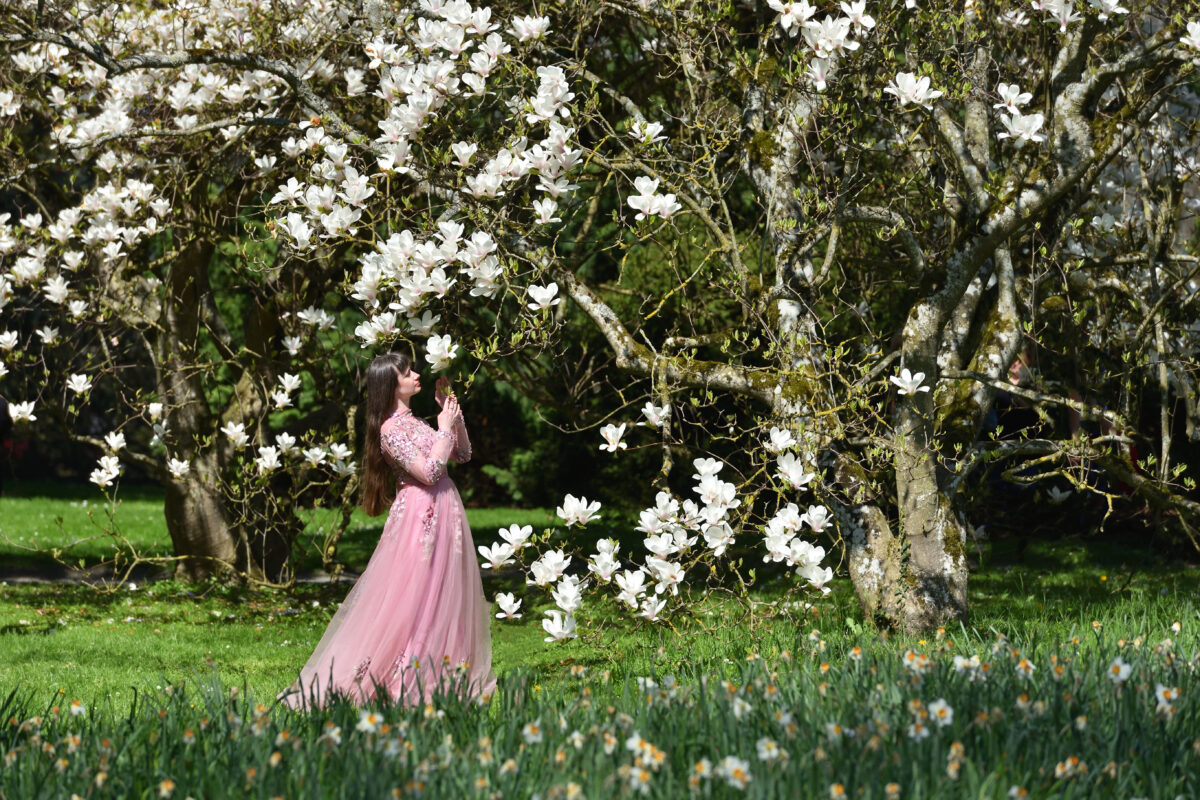
“Awakening” by Margaret Elizabeth Munson Sangster
Never yet was a spring-time,
Late though lingered the snow,
That the sap stirred not at the whisper
Of the south wind, sweet and low;
Never yet was a spring-time
When the buds forgot to blow.
Ever the wings of the summer
Are folded under the mould;
Life, that has known no dying,
Is Love’s, to have and to hold,
Till sudden, the bourgeoning Easter!
The song! the green and the gold!
“An Easter Song” by Margaret Elizabeth Munson Sangster
The golden sun climbs up the sky,
The shadows flee away,
Oh! weary heart, forget to sigh,
God sends thee Easter Day!
Long was the night, chill was the air,
And grief o’er brooded long,
Yet is the new world white and fair,
Uplift thine Easter song!
The cross that bowed thee with its weight
By strength of prayer is stirred,
Till it shall bear thee soon or late,
As wings upbear the bird .
The life that thrills from star to star,
And beats in leaf and stem,
Is wider than the heavens are,
And blesses thee from them.
Wert thou cast down, wert thou dismayed,
Dear child of One above,
Behold the earth in light arrayed,
The light of deathless love.
Oh! listen to the word that wakes
In every budding flower,
And take the bread the Master breaks,
In His triumphant hour.
Nor feel, dear one whom Jesus saves,
And heartens day by day,
That earth is but place of graves,
A dim and dolorous way.
As mothers hush their little ones,
God puts his own to sleep;
And long as time is marked by suns,
Their beds His angels keep.
Not once a year alone, but oft
In all our years of days,
Shall fall the word or promise, soft
As hymns the blessed raise.
If but we bend the listening ear
To hear upon the strand
The wave-beat of the endless life ,
Not far, but close at hand.
For those who hear, and hearing yearn,
The King hath secrets sweet;
Their hearts within them thrill and burn,
They wait His coming feet.
Then swift the sun climbs up the sky!
The shadows flee away!
Oh ! weary heart, forget to sigh,
God sends thee Easter Day!
“Easter Flowers” by Margaret Elizabeth Munson Sangster
Blooming to garland Easter,
White as the drifted snows,
Are the beautiful vestal lilies,
The myriad-petaled rose,
Carnations with hearts of fire,
And the heather’s fragrant spray
Blooming to garland Easter,
And strew our King’s highway.
Late we had gloom and sorrow,
But the word from Heaven forth
Has scattered the clouds before it
Like a trumpet blown from the north ;
And east and west and southward
The flowers arise to-day
To garland the blithesome Easter,
And strew the King’s highway.
Carry the flowers of Easter
To the darkened house of woe,
With their message of strength and comfort
Let the lilies of Easter go ;
Scatter the Easter ssoms
In the little children’s way ;
Let want and pain and weakness
Be cheered on our Easter day.
For lilac, and rose, and bluebell,
And whatever name they wear,
The spell of the flowers of Easter
Is a spell to banish care ;
And blooming to garland Easter,
They will shine in church to- day,
The lovely things that have awakened
To deck our King’s highway.
